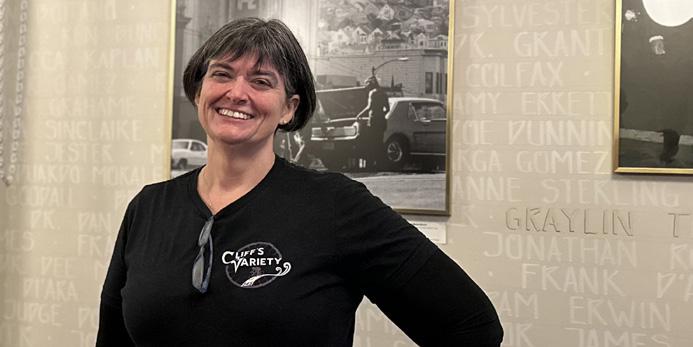


A recount is being sought in the primary race for an open South Bay U.S. House seat where gay Assemblymember Evan Low tied for second place.
Recount sought in South Bay House race
by Matthew S. Bajko
At least two people have asked for a recount of the primary race for an open South Bay U.S. House seat where gay Assemblymember Evan Low (D-Cupertino) tied for second place. One person has ties to firstplace finisher Sam Liccardo, the Democratic former mayor of San Jose.
Liccardo came out ahead with 38,489 votes. Low and Democratic Santa Clara County Supervisor Joe Simitian both received 30,249 votes. The trio is running to succeed Congressmember Anna Eshoo (D-Palo Alto), who decided to retire when her current term expires.
It reportedly marked the first time three candidates come out on top in a primary race since California began using its open primary system. Adopted by voters in 2010, normally only the top two vote-getters regardless of party affiliation advance out of the primary to the general election.
As the Bay Area Reporter noted last week, in the case of a tie in a primary race for one of the top two positions advancing to the general election, both candidates would appear on the fall ballot. Thus, in the race for the District 16 House seat spanning San Mateo and Santa Clara counties, Liccardo, Low, and Simitian would all compete in the November 5 election.
Unless a recount of the vote found Low or Simitian to have singly won second place. Any registered voter in the state had until Tuesday, April 9, to request a recount, which they would be required to pay the estimated tens of thousands of dollars it will cost to undertake.
None of the candidates had said they would seek a recount. But as KTVU Channel 2 reported Tuesday Liccardo’s former mayoral policy director, Jonathan Padilla, was one of the requesters. The other was Dan Stegink, a former candidate for San Mateo County supervisor, reported the local Fox affiliate.
See page 10 >>
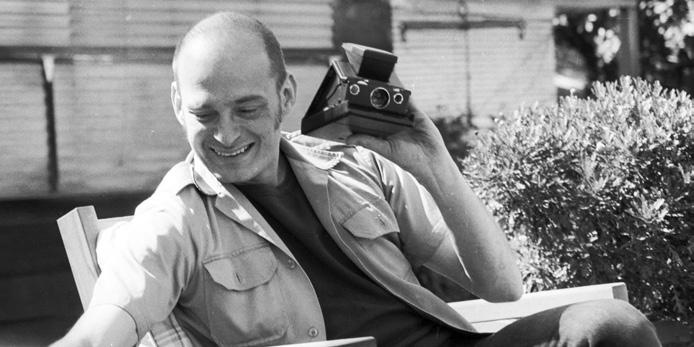


LGBTQ bills advance in Sacramento
by Matthew S. Bajko
With state legislators back from their spring recess, various LGBTQ bills are advancing out of oversight committees in the California Legislature. As in previous years, most of the bills are related to health issues or protecting transgender individuals who have come under increasing attack by Republican leaders and conservative groups.
One bill attracting significant interest from LGBTQ health advocates is Senate Bill 957 authored by gay state Senator Scott Wiener (D-San Francisco). As the Bay Area Reporter first reported in January, the legislation aims to ensure that state health officials are meeting their requirements to ask about sexual orientation and gender identity demographics, known as SOGI data for short.
It is in response to a scathing 2023 report from California’s state auditor that found the statewide health department’s SOGI data collection efforts were woefully inadequate. If enacted, SB 957 would require that state health officials implement all of the recommendations in the audit.
Having made it out of the Senate Judiciary Committee in March, the bill earlier this month passed out of the Senate Judiciary Committee on a similar 9-2 vote. It is now before the Senate Appropriations Committee, where it could be taken up on April 15.
“We can’t fix a problem we can’t measure, and with SB 957 we can take a critical step to delivering
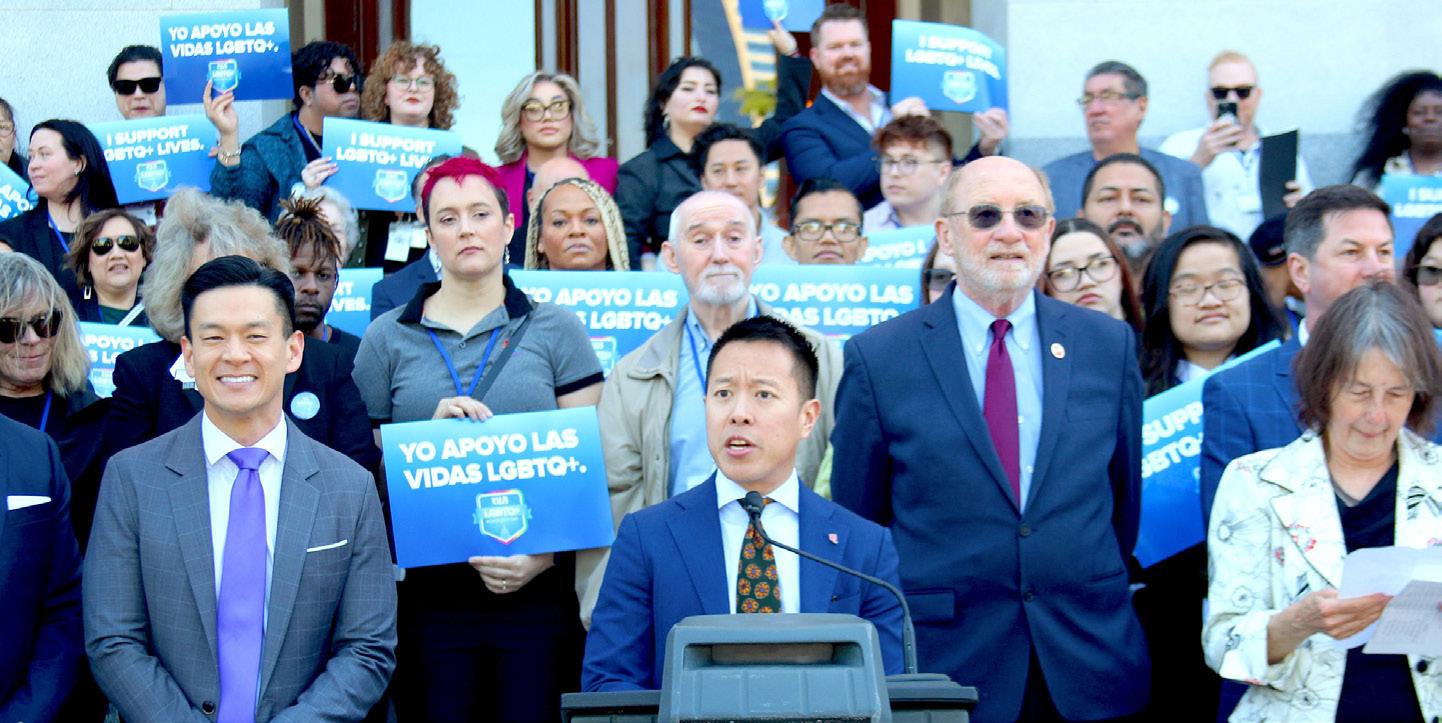
true health equity,” stated Wiener. “California must begin collecting data to understand the unique health challenges faced by LGBTQ people.”
Statewide LGBTQ advocacy organization Equality California, the California LGBTQ Health & Human Services Network, and the San Francisco AIDS Foundation are all sponsoring the bill. The California Legislative LGBTQ Caucus is a co-sponsor and has made it one of its priority bills this year.
“Opposition to the bill was also present at both hearings, where hateful and dehumanizing misinformation about LGBTQ people and our lives were shared. The increase in anti-LGBTQ sentiments across the state and country has been heightened even further during this election cycle,” noted Isaias Guzman, the LGBTQ health network’s manager of programs, in a recent email seeking other agencies’ support for it.
Public will be able to purchase much-debated SF Castro Theatre seats
by John Ferrannini
Later this month the public will be able to purchase the orchestra-level seats that once adorned the Castro Theatre in San Francisco’s LGBTQ neighborhood. The seating has already been removed as preservationists work up high above on scaffolding to save century-old paintings in the historic movie palace.
Another Planet Entertainment, which took over management of the theater two years ago and announced a controversial renovation and restoration project, gave reporters and others a tour of the venue April 3-4. After a lengthy process of getting approval from various city governmental bodies to move forward with the project, the theater temporarily closed to the public February 4.
“The scaffolding took a week and a half,” said Landes Dixon, APE’s venue coordinator. “The seats came out first, the seats took three days, and then the chandelier came down next, and the scaffolding went up immediately after that.”
Mary Conde, APE senior vice president, said those seats will be available for purchase on the group’s website April 15; the proceeds will go to Oasis Arts and the Castro Organ Devotees Association. The organ group has long been working to raise the funds needed for the installation of a new organ, which it claims will be the largest hybrid (pipe/digital) organ in the world.
Oasis Arts was started in 2022 by D’Arcy

Drollinger, who last year was named San Francisco’s inaugural drag laureate. Drollinger previously told the

Serving the lesbian, gay, bisexual, transgender, and queer communities since 1971 www.ebar.com Vol. 54 • No. 15 • April 11-17, 2024 'Mary & George' ARTS 13 13 ARTS Fetish illustrator Rex dies 08 02 The Merchants prez reelected Untitled-2 1 4/3/24 12:26 PM 'Sweatshop Overlord'
B.A.R. that the nonprofit supports local LGBTQ artists, drag performers, filmmakers, and others. Roughly $300,000 has been donated to the organization, with much of the funding coming from the San Francisco Film Commission and the Ken-
neth Rainin Foundation, Drollinger said last year. Drollinger told the B.A.R. April 9 that “the goal of Oasis Arts is to elevate our community, so that has been my goal,” and that “I do believe they [APE] are trying to make space for the community.”
Scaffolding has been erected over the orchestra level of the Castro Theatre as renovation work begins on the ceiling. John Ferrannini
See page 6 >>
Courtesy the candidate
Equality California Executive Director Tony Hoang speaks April 8 on the steps of the state Capitol where he was joined by lawmakers and LGBTQ advocates.
page 8 >>
Courtesy Assemblymember Chris Ward’s X
See
Merchants group reelects prez Asten Bennett
by John Ferrannini
C astro Merchants Association
President Terry Asten Bennett and other incumbent board members rode an easy path to reelection at the organization’s April 4 meeting.
In other matters, members heard about parking enforcement, and the need for donations from the volunteer safety group Castro Community on Patrol.
Association elects leaders
Asten Bennett, a straight ally who co-owns Cliff’s Variety at 479 Castro Street, years ago served as the merchant group’s leader and stepped up last year to again head the organization after the former president was ousted, as the Bay Area Reporter reported at that time. This year she was unopposed.
“I love our community and I am proud to serve as the Castro Merchants president for the well-being of our community,” she stated to the B.A.R. “I can’t do the impossible but it doesn’t stop me from trying.
“And if you are a merchant in the Castro, and you haven’t yet joined or renewed for this year, it isn’t too late,” she added. “The more merchants we represent, the louder our voice is heard.”
Gay District 8 Supervisor Rafael Mandelman was present at the meeting; he thanked the board candidates for stepping to the plate.
“Thanks to all of you who’ve stepped up to run for the board,” Mandelman said. “This is a very important organization and Terry: thank you for your work, and your second tour of duty. Terry has been on us about the many challenges on Castro Street.”
Those include commercial vacancies, which have declined in the past year as the B.A.R. recently reported, as well as tent encampments and drug use.
“There’s still a little party in the Castro at night and if you wake up at 6, 7 in the morning, as I do, you see the effects of that,” Mandelman said. “At a larger level, San Francisco needs to be doing more – as I’ve said for years – to try and end unsheltered homelessness.”
The board is rounded out mostly by other incumbents, with the only newcomer being straight ally Dimitra Fanourgiakis of Agean Delights at 545 Castro Street. Fanourgiakis’ business opened during the COVID pandemic.
“All my life I’ve supported freedom,
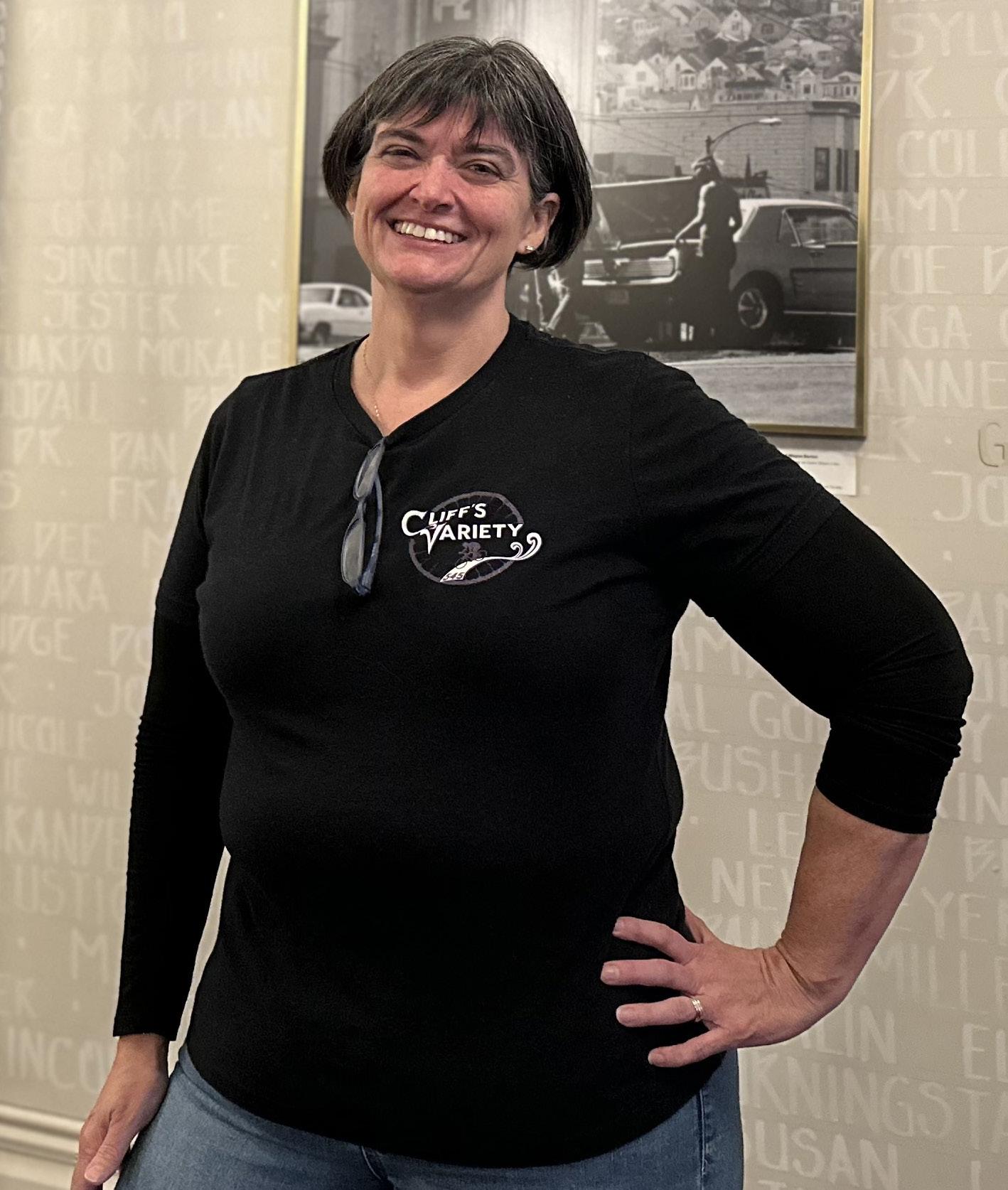
equality, justice, and volunteered with nonprofit organizations,” she said, making her pitch to the members. “It’s not just a shop; it’s a place to promote love and acceptance, and that’s why we chose the Castro. We love the Castro and I’d love to be on the board and I’d love to bring more people.”
There were two elections. The first to elect people to the board was done via secret ballot. The second election to board positions was done by a show of hands.
Nate Bourg, a gay man who is a coowner of The Academy SF, a social club at 2166 Market Street (where merchants hold their meetings), was reelected and was subsequently reelected treasurer with zero no votes and no abstentions. He said he is “enthusiastic to do it again and serve to the best of my ability.”
Desmond Morgan, a gay man who is co-owner of Eureka Sky, a cannabis dispensary at 3989 17th Street, was reelected and was subsequently reelected secretary with zero no votes and no abstentions. Morgan said he “would love to continue to help bring more foot traffic back to
the neighborhood.”
Jenn Meyer, a straight ally who owns Local Take, a gift shop at 4122 18th Street, was reelected and subsequently reelected vice president with zero no votes and no abstentions. Meyer did not return a phone request for comment as of press time.
The board was rounded out by members Fanourgiakis; Patrick Batt, a gay man and former merchants president who owns Auto Erotica at 4077 A 18th Street; Max Khusid, who identifies as an LGBTQ advocate and owns Art House SF gallery at 2324 Market Street; Steve Martel, owner of PO Plus at 584 Castro Street; and Leon Shannon, owner of Skin on Market at 2299 Market Street. All nine positions were filled. (Martel and Shannon were not present at the meeting.)
Traffic enforcement up in Castro district
In other news, Thomas Harvey, captain of the San Francisco Police Department’s Mission Station, told the merchants that parking enforcement in the station’s purview – including much of the Castro – is up.
In February, officers issued 150 moving violations for traffic enforcement in the area. “That doesn’t cover advisements,” Harvey said, referring to situations in which only a verbal warning is given. In March, 270 moving violations were issued, he said.
The reason for the uptick, he said, is that “from time to time we get specific complaints” about an area having traffic issues.
Mandelman said that “we are super excited, grateful and glad” for the parking enforcement.
“It’s still a fraction of where they were at 10 years ago, and it’s not entirely their fault,” Mandelman said. “We have changed the rules on them, because of all the paperwork, but we need to do this to reduce fatalities and crashes.”
Harvey briefly mentioned a sideshow that occurred at Market and Castro streets around 12:30 a.m. March 17. He said sideshows cause “great concern for everyone,” but it’s “hard to predict where it might happen.” As the B.A.R. reported at the time, a sideshow is an illegal demonstration of auto stunts, sometimes held on freeways, at intersections, or on vacant lots. Police are searching for vehicles that participated in the one in the Castro, which began after police broke up another sideshow at South Van Ness Avenue and 13th Street.
In 2025, upper Market Street should be getting a camera the city is adding in an attempt to stop speeding, Mandelman said. According to the San Francisco Municipal Transportation Agency, it will be on Market Street from Danvers to Douglass. Another one near Liberty Hill on the edge of the Castro District will be installed on Guerrero Street from 19th Street to 20th Street.
There are currently 13 intersections with red-light cameras, none of which are in the Castro, according to SFMTA’s website. The California Supreme Court ruled in 2014 that red-light cameras are constitutional, though some legal experts disagree. Eureka Sky’s Morgan asked about the forthcoming ban on right turns at red lights at some 200 mostlydowntown intersections. SFMTA approved the bans last month, supported by Mayor London Breed, as a way to reduce traffic fatalities; while most cities allow right-on-red turns some, like Seattle or Washington, D.C., have citywide bans on the practice. Mandelman emphasized this is not a citywide ban, though some, he said, believe that would be a good idea.
“If we prevent the behaviors most associated with running someone over, that’s the thinking,” he said.
Castro patrol seeks donations
Finally, merchants heard from officials with Castrol Community on Patrol, the volunteer safety group in the LGBTQ neighborhood. As the B.A.R. previously reported, CCOP will be formally honored by the FBI on April 19. (Local FBI agents presented the award in San Francisco last month so that people could join in congratulating the group.) CCOP also recently received commendations from Breed and the Board of Supervisors.
However, the recognitions come during troubled times for the organization. It had been fiscally sponsored by SF-SAFE, the nonprofit that is now the subject of a criminal investigation by the San Francisco District Attorney’s office for alleged misuse of public funds.
A city controller’s report found that SF-SAFE spent $80,000 of public money from the police department on expenses not eligible to be reimbursed, including a trip to Lake Tahoe and limousine service. The nonprofit’s executive director, Kyra Worthy, was subsequently fired.
Mission Local reported that SFSAFE – which is now out of money and no longer receiving police funding – owes half a million dollars to its landlord at an expansive space in the Mission neighborhood. Former workers at the nonprofit filed a labor complaint late last week to try and get some of their unpaid wages.
In November 2023, weeks before the scandal broke, SF-SAFE ended its affiliation with CCOP without explanation, according to Greg Carey, a gay man who is chair of the 18-yearold volunteer safety group.
“We were told in August we had $82,000 available in funds from the city and private donations and then we were told in November we have $0 available and had bills of $11,000,” he said. “We are now looking for donations to pay off the people we owe money to, and then continue with our services.”
CCOP is asking people to donate through a GoFundMe at https:// www.gofundme.com/f/help-castropatrol-get-back-on-its-feet, which has raised $2,085 as of April 9. Alternatively, in order to avoid the 3.9% GoFundMe handling charge, checks can be mailed to Castro Community on Patrol, 584 Castro Street No. 731, San Francisco, CA 94114.t


2 • Bay area reporter • April 11-17, 2024 t 415-626-1110 130 Russ Street, SF okellsfireplace.com info@okellsfireplace.com OKELL’S FIREPLACE Valor LX2 3-sided gas fireplace shown here with Murano glass, and reflective glass liner
<< Community News
Cliff’s Variety co-owner Terry Asten Bennett was easily reelected as president of the Castro Merchants Association at the group’s April 4 meeting.
John Ferrannini
SF Eagle to hold benefit for Cat Club
compiled by Cynthia Laird
After years of holding benefits for local nonprofits, the SF Eagle Bar will be helping a fellow business as it recovers from a break-in and robbery with a fundraiser Satur day, April 13, from 3 to 6 p.m. at 398 12th Street.
According to a news release, the Eagle benefit will help the Cat Club, a late night club located at 1190 Folsom Street. Both establishments are within the Leather & LGBTQ Cultural District in the West South of Market area. The Eagle is a longtime LGBTQ bar that caters to the leather and bear communities.
Gay chorus to hold 3rd oral history panel
The San Francisco Gay Men’s Chorus will hold the third of its Memory Keepers Initiative oral history programs Thursday, April 18, at 7 p.m. at the Chan National Queer Arts Center, the chorus’ home at 170 Valencia Street.

This installment is titled “Raising the Curtain on San Francisco’s Queer Arts Legacy,” and is hosted by the GLBT Historical Society.
A break-in and robbery occurred at the Cat Club that resulted in thousands of dollars worth of damages, the release stated.
Randy Maupin, general manager of the Cat Club, told the Bay Area Reporter that the incident occurred about three weeks ago in the early morning hours. The safe was stolen and the perpetrator got into the club’s liquor room and took product, he said. About $10,000 in cash was in the safe, Maupin said.
The break-in was reported to the San Francisco Police Department, Maupin said, adding that the club’s head of security happened to be on site early and noticed the safe was missing.
SFPD did not respond to a request for comment.
Maupin, a queer man, said he’s grateful for the SF Eagle to be stepping up.
“I’m very fortunate to have them in my life,” he said. “For them to step in as a SOMA bar and assist other venues is huge.”
Lex Montiel, the owner of the SF Eagle, stated that he’s happy to lend a hand.
“We believe in the strength of our community and the power of coming together in times of need,” he stated. “This fundraiser is our way of demonstrating our unwavering support for our neighbors and ensuring that those affected have access to the assistance they deserve.”
Attendees of the fundraiser can contribute by purchasing a $20 beer bust cup, which includes a substantial meal, the release stated. Additionally, adding an extra layer of entertainment, guests will be treated to performances by local drag artists. Cat Club’s Porter Venn will DJ the event.
Castro cleanup event
The Eureka Valley Neighborhood Association is holding a Castro cleanup event Saturday, April 13, from 10 a.m. to noon. According to the group’s newsletter, people should meet at Jane Warner Plaza at the corner of 17th and Castro streets. EVNA will provide gloves, tongs, a trash bag, and safety vests.
Attendees can meet EVNA board members Rob LeVan and Gabriel Markoff.
In the event of rain, the cleanup will be postponed to Saturday, May 11.

Panelists will include Scrumbly Koldewyn, one of the Cockettes original founders; Jewelle Gomez, an author, poet, and playwright; and Seth Eisen, founder of Eye Zen Productions.
The Cockettes, a legendary performance group, caused a sensation and set a tone for a new type of queer performance, a news release noted. Another of its original members, Rumi Missabu, died April 2 at his Oakland home, as the B.A.R. reported.
Gomez’s early novel, “The Gilda
Stories,” helped define the term Afrofuturism.
Eye Zen is known for its creation of a hybrid form of theater that combines live performance and visual media.
“San Francisco’s queer arts legacy has a rich and complex history and has brought artists like Divine, Sylvester, and Kiki and Herb to national attention,” stated Jacob Stensberg, a gay man who is the chorus’ artistic director, referring to the late drag artist, late disco star, and drag cabaret duo that performs in New York City.
In addition to the 90-minute interactive panel discussion, attendees are encouraged to remain afterward and record their own stories about queer history in the Bay Area. Volunteers will be on hand to audio or video record anyone with a story to tell and a desire to share it for posterity.
Tickets are pay what you can, ranging from $10 to $50, with $30 the recommended amount. For tickets and more information, go to https:// tinyurl.com/3bfnzdz2.t

New Affordable Homes for Sale in Mission Bay
homes priced from $260,000 - $501,000 without parking will be available. Applicants must be a first-time homebuyer and earn no more than the income levels listed below:
One
Register for the Hard Hat Tours Today!
• Saturday, April 27th | 10:00am - 12:00pm



April 11-17, 2024 • Bay area reporter • 3 t
$126,850 Three People $142,650 Four People $158,500 Five People $171,200 Six People $183,850 Household Size Maximum Annual Income
Below Market Rate Condominium for middle-income, first-time homebuyers. One-bedroom, two-bedroom and three-bedroom
Person $110,950 Two People
148
• Friday, May 3rd | 11:30am - 1:30pm • Wednesday, May 8th | 4:00pm - 6:00pm Apply online through DAHLIA, the SF Housing Portal at www.housing.sfgov.org | Applications Due May 31st All material is intended for informational purposes only and is compiled from sources deemed reliable but is subject to errors, omissions, changes in price, condition, sale, or withdrawal without notice. Floor plans are drawn to varying scales to maximize visibility when printed. The floor plans, elevations, renderings, features, finishes and specifications are subject to change at any time and should not be relied on as representations, express or implied. Square footage or floor areas shown in any marketing or other materials is approximate and may before or less than the actual size. This is not intended to solicit property already listed. No financial or legal advice provided. Equal Housing Opportunity. 400 China Basin is part of the City’s Limited Equity Program and buyers must qualify for the program to be eligible. Photos may be virtually staged or digitally enhanced and may not reflect actual property conditions. Real estate consulting, sales and marketing by Polaris Pacific - a licensed California, Arizona, Colorado, Hawaii, Oregon and Washington broker CA DRE #01499250 Register today! www.400ChinaBasin.com
Community News >> A crowd partied on the patio at the SF Eagle during a recent beer bust benefit. Courtesy SF Eagle


LGBTQ caucus has CA budget ideas
The California Legislative LGBTQ Caucus has released its list of priority bills, legislation it supports, and, crucially, priority budget requests.
The latter is important because the governor and lawmakers are working to close a budget deficit that could be between $38 billion and $73 billion, according to officials.
Among the caucus’ priority legislation is Senate Bill 954 by lesbian state Senator Caroline Menjivar (D-San Fernando Valley). This bill, a version of which was vetoed by Governor Gavin Newsom last year, is the Youth Health Equity and Safety Act, or YHES. It seeks to address the sexually transmitted infection epidemic among California youth and improve equitable public health outcomes statewide by expanding teen access to condoms in schools and communities.
We were critical of Newsom’s veto last year and encouraged Menjivar to reintroduce the legislation. In his veto message, he blamed its estimated $4 million cost, calling it an unfunded mandate for school districts, many of which are also cashstrapped. But condoms are cheap, and when purchased in bulk like the state could do, cost pennies apiece.
This year, the caucus has a solution to at least a bit of the budget problem. One of Newsom’s proposals to close the state’s deficit is to borrow $500 million from the AIDS Drug Assistance Rebate Fund and transfer that money to the general fund. The caucus has a better idea: reduce the ADAP loan to $250 million, of which $5 million must go toward the YHES Act. In other words, the caucus has found a workaround to fund the condoms in schools.
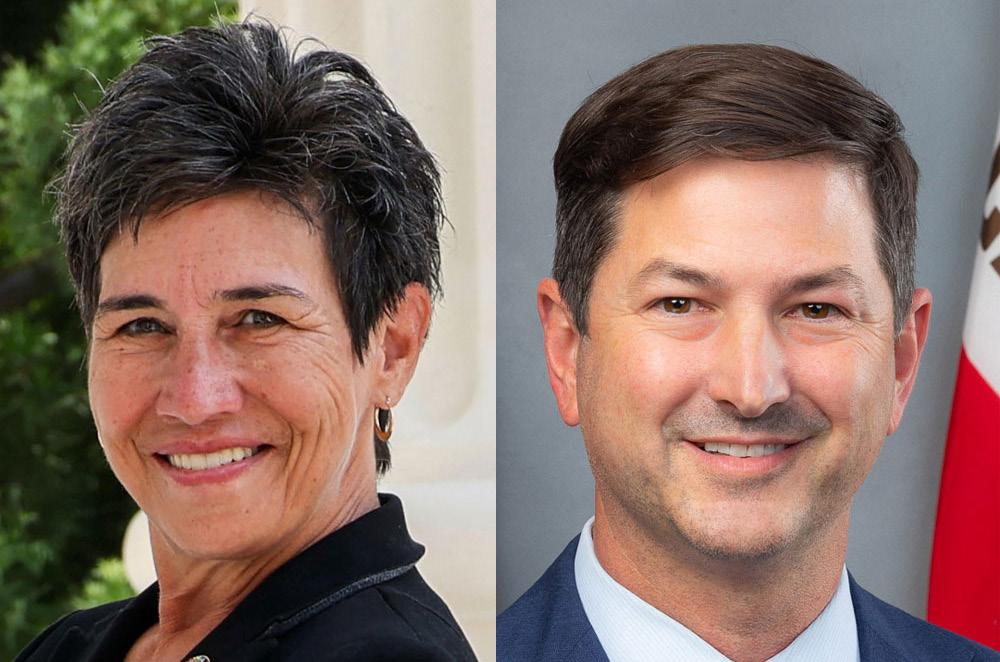
clients who need this service. These include an ADAP and PrEP Assistance Program eligibility increase from 500% of the federal poverty level to 600%, a one-time expense of $3.5 million; a $10 million one-time increase to the Harm Reduction Clearinghouse; and a $3.5 million onetime health insurance premium payment cap and $7 million (ongoing).

The caucus is also calling for $5 million (ongoing) for the TGI Wellness Equity Fund to pay for trans-related services across the state. It also wants $400,000 for needs assessments and analyses for both gap identification and client navigation and retention services, as well as a PrEP navigation program.
sex immigrants. And the caucus wants to renew previously allocated funding for the “Preservation and Accessibility of California’s LGBTQ+ History Program,” which is a competitive grant program that is administered by the California State Library. The program supports LGBTQ+ archives of all sizes.
In 2019, a state library funding request to maintain $500,000 in funding for eight LGBTQ archival groups was denied, as the Bay Area Reporter noted at the time. But in 2022, the state library was able to grant $750,000 to LGBTQ history projects, as the paper also reported.
There’s another budget priority of the caucus: Investing $5 million in state funding to be used toward the installation of a new ADA-compliant main stairway and a new escalator to access the entrance to the Castro Muni Station for Harvey Milk Plaza. This is part of the planned $35 million Memorial at Harvey Milk Plaza project, and likely would be pooled into the other public funds already awarded, but used for the specific ADA items. The city is already in the process of installing a new elevator, which is separate from the plaza redo; the stairs and escalator would go a long way toward making accessibility improvements to the Muni station.
Additionally, the caucus’ budget request seeks several modernizations to ADAP to help more
Other priority budget requests include $250,000 to be divided into three programs to help bring equity, justice, and inclusion for transgender, gender-nonconforming, and inter-
These budget requests are important because we know it will be a tough year. We suspect that many bills will not be approved due to their cost. Yet at the same time, it’s critical that the LGBTQ community be able to maintain services, particularly around health issues, and that the trans community also receives some budget equity. We realize the requests from the Legislative LGBTQ Caucus don’t go far enough, but given the seriousness of the deficit, we think the caucus has done a good job at setting its priorities.t
Financial stability is key for diverse communities
by Joaquín Torres
As your elected assessor-recorder, my staff and I are committed to providing excellent public service and ensuring San Francisco’s financial stability through the work we do every day, fairly and accurately.
The approximately $4 billion in revenue generated by our work in assessing the taxable value of all property allows the city to address our most pressing needs in service to our diverse constituencies from public safety to economic recovery, mental health and homelessness, small business support and public education, transportation and our parks, affordable housing and more.
Our approaches to this work become more essential than ever during times of transition, uncertainty around property values, a changing downtown, and rising assessment appeals. While property tax is a more stable source of revenue for the city, being less volatile than other types of taxes – the city controller is projecting that we’ll see less growth in the coming fiscal year, dropping to approximately 3% from the 4.6% we saw this year, largely due to the impact of office vacancies and high interest rates.
At the same time, we’re focused on addressing the rise in both commercial and residential assessment appeals, which have ballooned to over 7,500 new appeals this year, more than triple what we were seeing before the pandemic. To meet this challenge, we’ve restructured our teams to create efficiency, resulting in our closing significantly more appeals these last two years. And we continue to advocate for more resources to support us as we face a years-long marathon of working through assessments in a timely manner and the appeals that lie ahead of us.
We’re making common sense changes that make it easier to access the public records like deeds of trusts, liens, marriage certificates, and more. It typically takes up to 10 days to receive an official marriage certificate after getting married. So, we’re piloting a process to provide same-day marriage certificates for newlyweds. We’ve digitized 7 million records and counting so that they may be offered online, saving people a trip to City Hall. Starting in May, we’ll be the only assessor-recorder in California to provide an option to download free, unofficial copies of records instead of having to purchase official ones before people can see what’s in them. And, for the first time in over two decades, we’re updating the fees for purchasing official copies of records, resulting in decreased costs for the majority of our constituents who purchase them online.
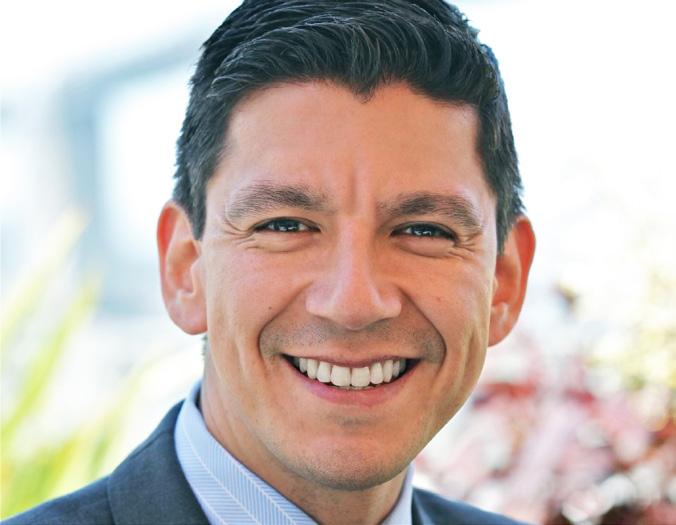
At our annual Family Wealth Forum at City College of San Francisco, neighborhood meetings, real estate agencies, community centers, and public libraries, we’ve given presentations and answered people’s questions on the issues that impact their finances like Proposition 19 (property tax transfers) and intergenerational transfers, business personal property, tax savings, how new construction impacts your property assessment, financial scam prevention, the legacy of housing segregation in San Francisco, and our work in redacting racially restrictive covenants in deeds and raising awareness of biases in the private appraisal market.
Estate planning

We’ve heard from residents that the costs of creating an estate plan, oftentimes thousands of dollars, are prohibitive. Estate planning is important – for individual families and for communities that want to see each other, generation to generation, present in the neighborhoods they live in. But the financial burden, the difficult conversations about death and what comes next, and the lack of accessible resources to help one understand why planning now is possible and can make a difference, often prevent people from protecting themselves and their families.
So, in 2021, we spearheaded an Estate Planning Program in partnership with the organization Housing and Economic Rights Advocates, or HERA. We believe that everyone across all diverse communities and income levels should be able to build intergenerational wealth and ensure that their hard-earned assets, wishes, and intentions are honored.
With financial support from the Crankstart Foundation, we’re providing 200 free and lowcost estate plans to San Franciscans, with a particular focus on the southeast and other neighbor-
hoods of our city where there is a combination of high homeownership rates, lower-income communities, and historically marginalized communities of color. We’re also collaborating with community-based organizations to share the process of creating a complete estate plan, which includes legal documents like a living trust, will, power of attorney, and advanced medical directive.
I’m excited to share that we’re hosting an Estate Planning Resources event for seniors on Friday, April 19, from 1 to 3 p.m. at the San Francisco LGBT Community Center at 1800 Market Street in partnership with HERA, the center, and Openhouse SF.
With these long-standing organizations that provide vital services to LGBTQ+ seniors and the community at large, we’ll be covering estate planning basics and sharing local resources for seniors such as low-cost estate plans, financial planning, and aging and disability services.
Estate planning is essential in avoiding probate and speeding up the settlement of an estate, but it’s not just for homeowners or people who may have many assets. Estate planning provides a critical foundation of safety and security for people during each step of their life. Having an advanced medical directive and power of attorney in place allows a person the freedom to choose who will care for them, have access to their medical and financial information, and carry out their intentions in the case of an emergency.
These items should not be left to chance. It’s important to have the necessary conversations now. Through our event on April 19, we hope to make this topic and our services more accessible to people, connect residents with the community organizations that can help them begin this process, build wealth from one generation to the next, and ultimately bring people peace of mind with the knowledge that their future is secure.t
Joaquín Torres, an ally, is the elected assessor-recorder for the City and County of San Francisco. The assessor-recorder’s mission is to fairly and accurately identify and assess all taxable property in the City and County of San Francisco and record, secure, and provide access to property, marriage, and other records.
If you have any questions on estate planning, property assessment, or any other topic, please don’t hesitate to call us via 311, email us at assessor@sfgov.org or drop in to our office in San Francisco City Hall, Room 190.
To RSVP for the April 19 estate planning event, go to https://tinyurl.com/pyepthnh.
4 • Bay area reporter • April 11-17, 2024 t << Open Forum Volume 54, Number 15 April 11-17, 2024 www.ebar.com PUBLISHER Michael M. Yamashita Thomas E. Horn, Publisher Emeritus (2013) Publisher (2003 – 2013) Bob Ross, Founder (1971 – 2003) NEWS EDITOR Cynthia Laird ARTS & NIGHTLIFE EDITOR Jim Provenzano ASSISTANT EDITORS Matthew S. Bajko • John Ferrannini CONTRIBUTING WRITERS Christopher J. Beale • Robert Brokl Brian Bromberger • Victoria A. Brownworth Philip Campbell • Heather Cassell Michael Flanagan •Jim Gladstone Liz Highleyman • Brandon Judell • Lisa Keen Philip Mayard • Laura Moreno David-Elijah Nahmod • J.L. Odom • Paul Parish Tim Pfaff • Jim Piechota • Adam Sandel Jason Serinus • Gregg Shapiro Gwendolyn Smith • Charlie Wagner Ed Walsh • Cornelius Washington • Sura Wood ART DIRECTION Max Leger PRODUCTION/DESIGN Ernesto Sopprani PHOTOGRAPHERS Jane Philomen Cleland Rick Gerharter • Gooch Jose A. Guzman-Colon • Rudy K. Lawidjaja Georg Lester • Rich Stadtmiller Christopher Robledo • Fred Rowe Shot in the City • Steven Underhill • Bill Wilson ILLUSTRATORS & CARTOONISTS Christine Smith VICE PRESIDENT OF ADVERTISING Scott Wazlowski – 415.829.8937 NATIONAL ADVERTISING REPRESENTATIVE Rivendell Media – 212.242.6863 LEGAL COUNSEL Paul H. Melbostad, Esq. Bay area reporter 44 Gough Street, Suite 302 San Francisco, CA 94103 415.861.5019 • www.ebar.com A division of BAR Media, Inc. © 2024 President: Michael M. Yamashita Director: Scott Wazlowski News Editor • news@ebar.com Arts Editor • arts@ebar.com Out & About listings • jim@ebar.com Advertising • scott@ebar.com Letters • letters@ebar.com Published weekly. Bay Area Reporter reserves the right to edit or reject any advertisement which the publisher believes is in poor taste or which advertises illegal items which might result in legal action against Bay Area Reporter. Ads will not be rejected solely on the basis of politics, philosophy, religion, race, age, or sexual orientation. Advertising rates available upon request. Our list of subscribers and advertisers is confidential and is not sold. The sexual orientation of advertisers, photographers, and writers published herein is neither inferred nor implied. We are not responsible for unsolicited manuscripts or artwork.
Assessor-Recorder Joaquín Torres SF Assessor-Recorder’s office
State Senator Susan Talamantes Eggman, left, and Assemblymember Chris Ward are the chair and vice chair, respectively, of the California Legislative LGBTQ Caucus.
Courtesy Legislative LGBTQ Caucus
by Matthew S. Bajko
In less than a month gay California appellate Justice Gonzalo Martinez is set to become the fourth out presiding justice on one of the state’s courts of appeal. He is expected to be confirmed in early May to the top position on the 2nd District Court of Appeal’s Division Seven.
As the Political Notebook first reported in March, Governor Gavin Newsom decided to elevate Martinez into the judicial leadership vacancy created by the retirement of Presiding Justice Dennis M. Perluss. Martinez had been serving as Newsom’s deputy judicial appointments secretary until the governor appointed him to fill a vacancy on the 2nd District appellate bench in early 2023.
The Commission on Judicial Appointments confirmed his judicial appointment last July. It will now take up his presiding justice nomination at 9 a.m. on May 14.
Martinez will be the first of three appeal court nominees the oversight body will vote on that Tuesday. Following his hearing will be ones for Superior Court Judges Natalie P. Stone and Tara Desautels to be associate appellate justices in Los Angeles and San Francisco, respectively.
Newsom nominated Stone, a Los Angeles County judge, to fill Martinez’s vacant seat on the 2nd Court of Appeal’s Division Seven. The appellate court covers the counties of Los Angeles, Ventura, Santa Barbara, and San Luis Obispo and is composed of eight divisions with four justices each.
Desautels, an Alameda County judge, was nominated by the governor to fill the vacancy created on the 1st District Court of Appeal’s Division Two by his elevation of lesbian Justice Therese Stewart as its presiding justice.
The appellate court covers the Bay Area Region and has five divisions with four justices each. Serving as its administrative presiding justice is gay Justice Jim Humes
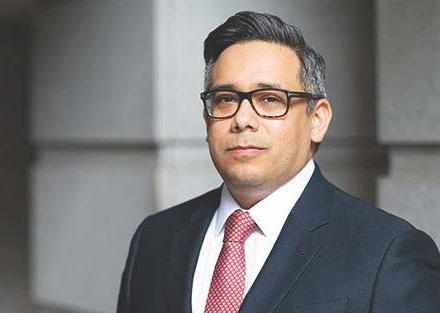
Those wishing to testify or send in written comments about Martinez’s appointment, or that of the two associate justices, must do so by 5 p.m. on May 7. For those who want to testify at the hearing, they must state their request in writing and include a summary of the facts on which any testimony or opinion will be based.
Submissions via email are preferred and can be sent to coja@jud.ca.govare. For more information about the upcoming confirmation hearings, visit https://newsroom.courts.ca.gov/ news/commission-consider-appointments-courts-appeal-5
Gay SF treasurer kicks off reelection bid

The other out presiding justice is Laurie M. Earl, a lesbian who presides over the 3rd District Court of Appeal. Altogether there are six known out Court of Appeal members in the state.
Gay Associate Justice David Rubin joined the 4th District Court of Appeal’s Division One last year. Gay Associate Justice Luis A. Lavin serves with Martinez in the 2nd District on its Division Three bench.
Martinez grew up the oldest of four children in the San Joaquin Valley where his non-English speaking immigrant parents worked as farm laborers. The first in his family to attend college, Martinez graduated from Harvard in 1998 and later earned his law degree from the Ivy League school in 2003.
Accepted into the bar a year later, Martinez worked at several law firms before becoming a partner in the Appellate and Supreme Court Practice Group at Squire Patton Boggs from 2007 to 2017. He spent two years as a deputy solicitor general in the California Attorney General’s Office.
Martinez then returned to the law firm until joining Newsom’s administration. He is married to tax attorney Raul A. Escatel
Once confirmed to his new position, Martinez will earn an annual salary of $272,902. His confirmation hearing will be broadcast live via the California Courts Newsroom website at https://newsroom.courts.ca.gov/
San Francisco Treasurer-Tax Collector José Cisneros, the only gay citywide municipal elected officeholder, is officially kicking off his 2024 reelection bid in the Castro Thursday night. He is seeking a record sixth term on the November 5 ballot.
As the Political Notebook column noted in March, Cisneros is the longest-serving openly gay elected official in the city. First appointed to his position in 2004 by Newsom, then San Francisco’s mayor, to fill a vacancy, Cisneros has not faced an opponent since his 2005 race for a full four-year term.
So far no one has filed papers to run against him this year, according to the city’s elections department. Anyone wishing to seek the position has until 5 p.m. Friday, August 9, to file the required paperwork.
Speaking to the B.A.R. earlier this year, Cisneros had said he isn’t expecting to be opposed this fall. Nonetheless, he pledged to still campaign for the seat.
“My feeling is I still have to take the election seriously. I think it comes as part of taking the job seriously,” said Cisneros, who is married to longtime San Francisco Human Rights Commissioner Mark Kelleher
Fulfilling that promise, Cisneros is holding his campaign kickoff Thursday, April 11, at The Academy. The LGBTQ social club is located at 2166 Market Street in the city’s Castro district. Doors open at 5 p.m. with light hors d’oeuvres followed by the program at 5:30. The reception will wrap at 7:30.
The event also kicks off the social clubs’ Our Academy Forum “Election 2024” series. It will feature various elected officials and candidates leading up to the fall ballot.
Attendees of the talk with Cisneros will “gain behind-the-scenes insights into City Hall from a financial perspective,” according to an invite from the social club.
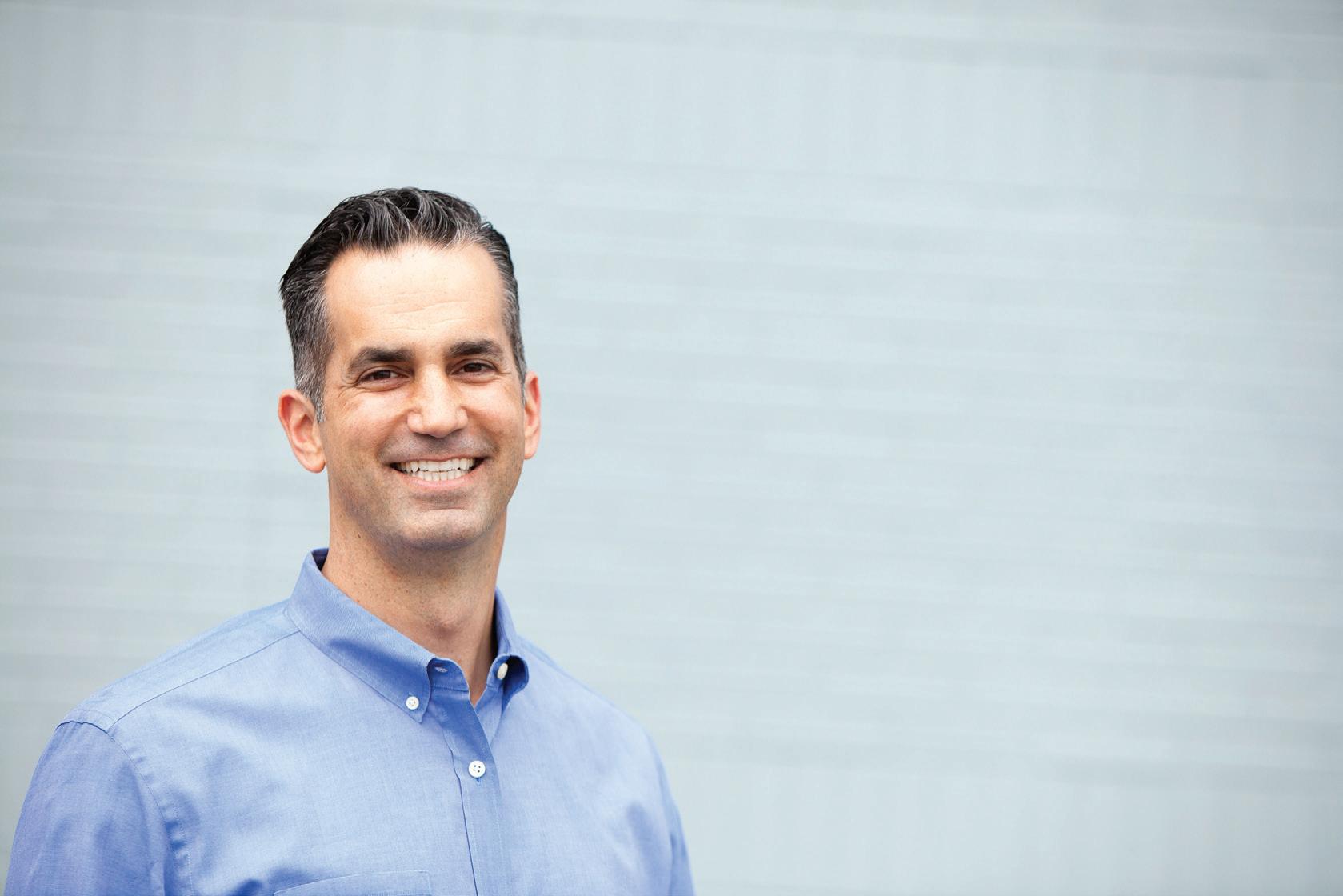
The event is free to attend and open to anyone in the public, not just Academy members. RSVPs are required and can be made online at https://tinyurl.com/472f2cm3.
While there is no cost to attend, Cisneros is using the event as a fundraiser. He is asking for donations starting at $100 that can be made online via the website ActBlue at https://secure.actblue.com/donate/jc24kickoff
Op-artist holds gallery show
Dorian Katz, who created the Political Notebook’s op-art offering for 2021, is holding her first solo show since 2017 when she was featured in the gallery at the Center for Sex & Culture in a show curated by Dorothy Santos. A queer Oakland resident, Katz had also curated various shows at the center’s now-closed space in San Francisco.
Her artwork is being featured throughout April at Oakland queerowned Crisis Club Gallery, located at 5887 San Pablo Avenue. Titled “Recent Drawings, 4 Groups, All Dirty by Poppers the Pony,” it opened April 5 and will be accessible over the next three weekends.
“I haven’t slowed down my output of art and am glad to be sharing my favorite drawings from the past few years,” wrote Katz in an emailed invite to the show. She created her cartoon steed character 18 years ago and renamed it Poppers the Pony in 2008. It is a play off the name gay men use to refer to nitrite inhalants sniffed during sex. Katz’s work is often censored or shadowbanned on social media platforms since she touches on sexuality, queer themes, and often features more voluminous body shapes in the nude.
The gallery will be open from 2 to 7 p.m. on Fridays, Saturdays, and Sundays. Katz will be present on the weekends and hosting different events during the open hours.
“There’ll be a Zine Show N Tell & a hang out and make stuff (draw, craft, collage) session. I’m excited to do some deep hanging out in small groups,” noted Katz.
For a list of the various events she is hosting tied to the show, visit https:// tinyurl.com/383te7pht
Web Extra: For more queer political news, be sure to check http:// www.ebar.com Monday mornings for Political Notes, the notebook’s online companion. This week’s column reported on Equality California’s 2023 report card for state legislators.
Keep abreast of the latest LGBTQ political news by following the Political Notebook on Threads @ https://www.threads.net/@matthewbajko.
Got a tip on LGBTQ politics? Call Matthew S. Bajko at (415) 8298836 or e-mail m.bajko@ebar.com.
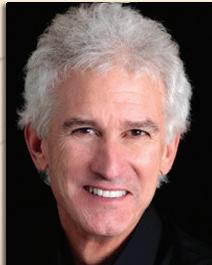

Planning Ahead is Simple
The
t Politics >>
you can design every detail of your own unique memorial and provide your loved ones with true peace of mind. Planning ahead protects your loved ones from unnecessary stress and financial burden, allowing them to focus on what will matter most at that time—you. Contact us today about the beautiful ways to create a lasting legacy at the San Francisco Columbarium. Proudly
the
FD 1306 / COA
One Loraine Ct. | San Francisco | 415-771-0717 SanFranciscoColumbarium.com
benefits are immense.
you plan your
you can design every
of your own unique memorial and provide your loved ones with true peace of mind.
protects your loved ones from
and financial burden, allowing them to
what will
at that time—you. Contact us today about the beautiful ways to create a lasting legacy at the San Francisco Columbarium. Proudly serving the LGBT Community. Planning
is Simple
benefits are
you plan your life celebration and lasting remembrance in advance, you can design every detail of your own unique memorial and provide your loved ones with true peace of mind. Planning ahead protects your loved ones from unnecessary stress and financial burden, allowing them to focus on what will matter most at that time—you. Contact us today about the beautiful ways to create a lasting legacy at the San Francisco Columbarium. Proudly serving our Community. FD 1306 / COA 660 One Loraine Ct. | San Francisco | 415-771-0717 SanFranciscoColumbarium.com Barry Schneider Attorney at Law •Divorce w/emphasis on Real Estate & Business Divisions •Domestic Partnerships, Support & Custody •Probate and Wills www.SchneiderLawSF.com 415-781-6500 *Certified by the California State Bar family law specialist* 315 Montgomery St , Ste. 1025, San Francisco, CA 94104 The Scott W. Wazlowski Vice President of Advertising advertising@ebar.com 44 Gough Street #302, San Francisco, CA 94103 (415) 829-8937 • www.ebar.com Advertise! Hearing set for gay CA appellate presiding justice nominee Martinez
benefits are immense. When you plan your life celebration and lasting remembrance in advance,
serving
LGBT Community.
660
Planning Ahead is Simple The
When
life celebration and lasting remembrance in advance,
detail
Planning ahead
unnecessary stress
focus on
matter most
Ahead
The
immense. When
confirmation hearing next month. Courtesy Governor’s office
Justice Gonzalo Martinez will have his
The organ committee did not return a request for comment by press time.
Flashpoint
The orchestra seats were a flashpoint in the debate over the theater.
The imbroglio over the theater began in January 2022, when APE, which runs the Outside Lands music festival in Golden Gate Park and the Bill Graham Civic Auditorium in San Francisco’s Civic Center area, was announced as the new operator of the 101-year-old Castro Theatre. It had heretofore been both owned and run by the Nasser family.
Some Castro neighborhood organizations, and LGBTQ and film groups – such as the Castro LGBTQ Cultural District and the Castro Theatre Conservancy – formed the Friends of the Castro Theatre Coalition in opposition to APE’s proposed plans.
Among the changes are the removal of the orchestra-level seats and their replacement with motorized, raked seating, so that the venue can be used for cinema as well as concerts.
Last year, the San Francisco Board of Supervisors approved the prerequisite ordinances allowing APE’s vision to move forward. The crucial vote, which passed 6-4, rejected an amendment that would have required the orchestra seating to be fixed. More recently, the supervisors approved allowing secondfloor alcohol sales throughout the Castro Street Neighborhood Commercial District last October 24, as the B.A.R. reported. The seats on that mezzanine level are slated to remain, having been designated as historical during the protracted approval process.
Gay District 8 Supervisor Rafael Mandelman, who represents the Castro on the Board of Supervisors and authored the resolution landmarking the interior of the theater, told the B.A.R. April 5 that he has no comment at this time on the status of the renovation project, but “we’re going to go take a look later this month.” (The exterior of the theater was designated a city landmark in 1977.)
Conde confirmed that the project is still slated to finish in 2025, and at a cost of $15 million.
The movie screen has also been removed – part of it was given to Queer Arts Featured at 575 Castro Street. Conde said APE wants to preserve “anything we can upscale and prevent from going to a landfill.”
Queer Arts Featured is an art gallery located at the site of slain former supervisor Harvey Milk’s Castro Camera shop.
Devlin Shand of Queer Arts Featured told the B.A.R., “I’m really grateful to APE. I’m excited they reached out.” The screen will be part of an interactive community exhibition at Queer Arts Featured starting June 7. Community members will have the opportunity to create art for several months, at which point different parts of the screen will be auctioned off to support further community exhibitions.
“It’s such a beautiful furthering of our ethos,” Shand said. “I love this

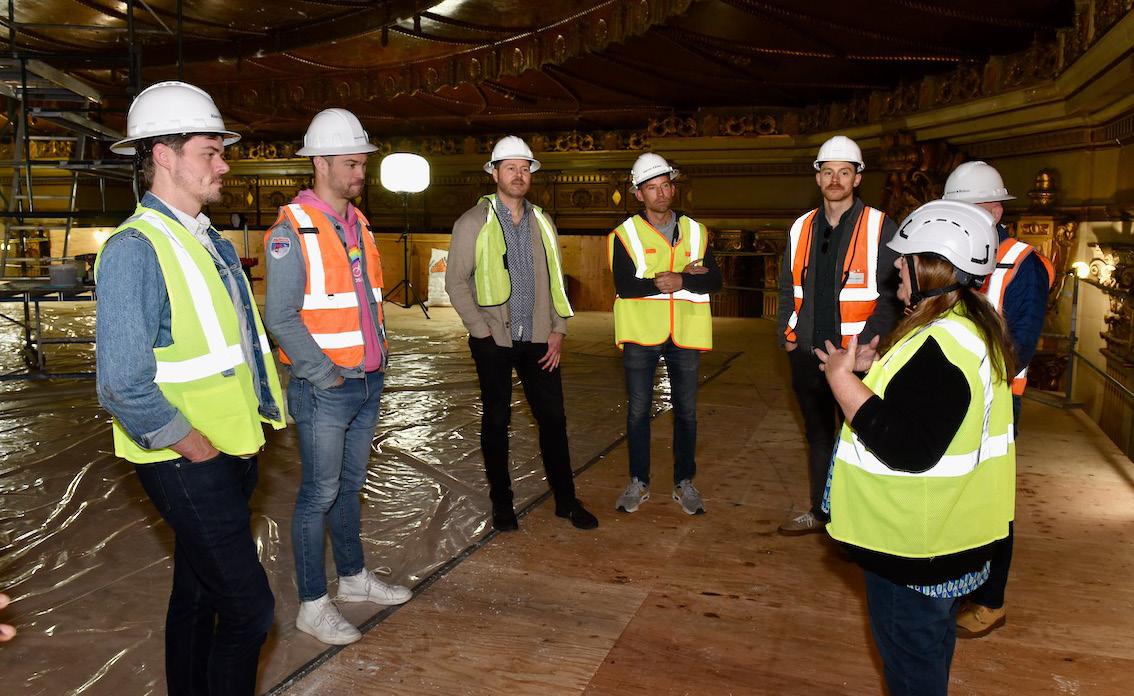
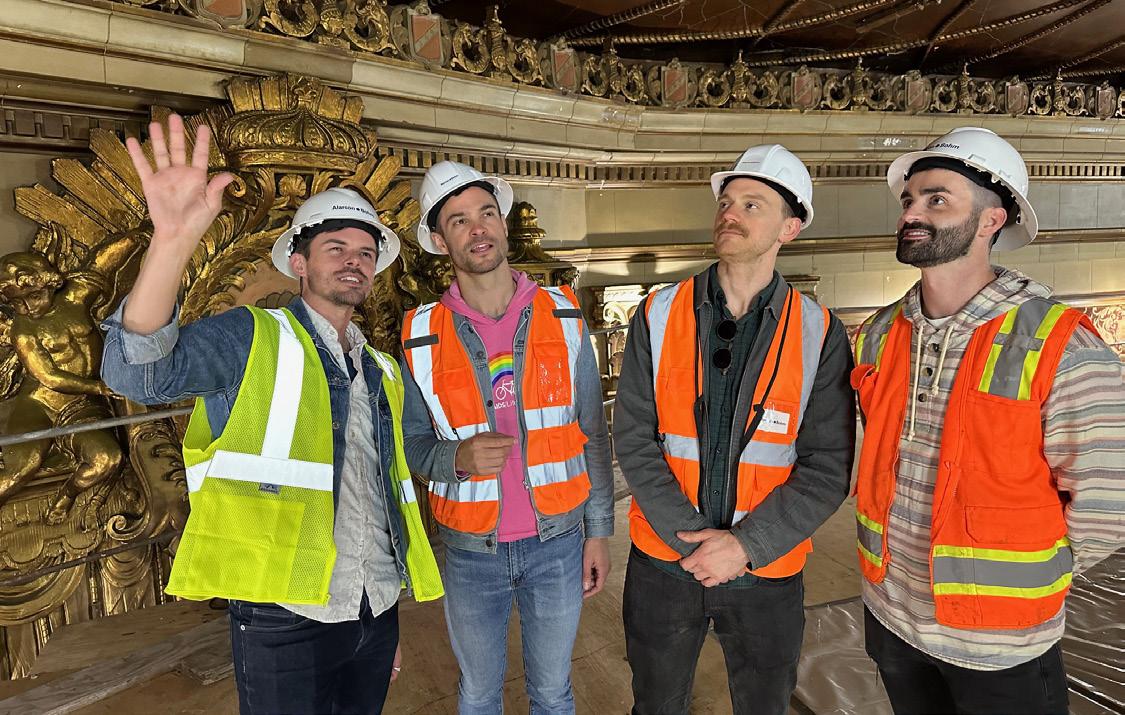
combination of something from the past: making it new.”
Original ceiling art being restored
Atop the scaffolding, Conde pointed to the work that architect Timothy Pflueger had painted on the ceiling, featuring figures drawn from various Asian cultures. He may have been making a political statement, she said. While Orientalism gripped American popular culture, it was also a time of heavy restrictions on immigration, including a complete ban on Chinese immigration via the Chinese Exclusion Act.
“In 1922, the movie theaters were trying to create a place to escape,” Conde said. “They wanted to create a fantasy land. We’re not 100% sure; he may have been trying to make a political statement that these were beautiful cultures.”

Clarence Calzada stated, “We’re very excited to be working on the Castro Theatre restoration. Especially as Phoenix Day worked on the original chandelier.”
Tony Brenta, owner of Phoenix Day, said that the company is in the process of making the new fixtures.
“We had a meeting with the lighting consultant folks from APE last week,” Brenta said April 8. “It looks like they’ll go with color-changing LEDs to upgrade the theater.”
Brenta said that Phoenix Day was also utilized for work on the War Memorial Veterans Building and the Legion of Honor museum.
Brenta, 66, started at the company at age 20. The company was brought in to make a chandelier for the Castro Theatre in the 1930s because “the original chandelier was paper and someone flicked a cigarette onto it and burned it down.” He believes it was his aunt’s uncle who built it.
Also getting replaced is the organ, which will be “taller, bigger, and badder” and “the largest symphonic organ in the world,” Conde said.
The B.A.R. asked the organ association its comment on the matter, but has not heard back.
Theater remodel opponent bemoans loss of seats
Gerard Koskovich, a queer public historian, was extensively involved in the efforts to fight APE’s plans. He had also submitted comprehensive information on the theater to city planning staff for its Landmark Designation Fact Sheet and consulted with Planning Department staff and community members, in addition to reviewing and editing the draft document, as noted in the report given to the historic preservation commission.
While his research was included in the final statement of significance for the theater’s history, it didn’t prevent the removal of the seats, which he vehemently opposed.
theater]. ... We’ve formed a unique queer public at the Castro Theatre –what sociologists call a counter-public – against the grain of the culture. … The amazing thing about the Castro Theatre is that it has an audience like nowhere else in the world – that’s us: a unique queer public that does not exist at all anywhere else and will not if APE has its way.”
When asked about the forthcoming seat sales, Koskovich likened it to saying, “We’ve just committed a massacre and are now selling the body parts for profit,” because, he said, Oasis Arts is a “separate shell” to give money to APE.
“No one should be mistaken – that is an utterly self servicing act typical of APE,” Koskovich said. “Oasis Arts was started up as a nonprofit to help community-based artists and organizations rent the Castro Theatre from APE, so it’s a way people can donate money to a nonprofit that will be given to APE.”
According to Oasis Arts’ 2022 IRS Form 990, which covers May-December of that year, it received $98,642 in grants. It had assets of $45,762, while $50,583 was distributed by the organization. Specific funding sources were not identified on the document.
In APE’s community benefits package for the theater, the company created a grant program to be administered Oasis Arts to allow LGBTQ artists, filmmakers, and community groups who otherwise might not be able to afford it to utilize the space.
David Perry, a gay man who is a spokesperson for APE, responded to the B.A.R.’s inquiry about Oasis Arts.
A previous effort to save the art, however, has helped facilitate its demise.
“When things shifted after the [Loma Prieta] earthquake in 1989, they were trying to help it stay in place,” Conde said, leading to polyurethane being added to the ceiling. The paintings – as well as fixtures such as gold leaf-flaked cherubs suspended on the wall – had already long been caked with soot from cigarette smoke and run-of-the-mill dust.
That polyurethane is visibly peeling.
“It was too heavy,” Conde said, then pointing to the ceiling, “It was the wrong product – so that’s the plaster falling apart.”
To restore the paintings, “they are going to have to do tracings of the detail and replicate” the parts that have been damaged, Conde said. “All of this artwork is hand painted. … They’re [the restorers] going with a microscope and really analyzing what the colors in the 1920s were.”
The restoration work is being done by EverGreene Architectural Arts, Conde said, which has worked in 48 of America’s 50 state capitol buildings.
“They are all-pro,” she said.
The New York-based company did not return a request for comment by press time.
A new screen and chandelier will also be added. The screen will be able to show 35mm film, 70mm film, and digital projection, Conde said.
“The chandelier was first installed in 1937 and it was a Phoenix Day –which is still in business, in Richmond – and it’s the great-grandson of the person who installed the [original] chandelier,” Conde said. “They are doing all the light fixture renovations.”
Phoenix Day General Manager
Koskovich, who has not taken a tour, told the B.A.R. on April 5, “It’s splendid that the historic ceiling of the theater will be restored, but that shouldn’t distract us from the fact that a key character-defining feature that makes the Castro Theatre a historic movie palace and a site of international importance for LGBTQ culture is at the same time being destroyed, being demolished by APE and the Nassers and what is being destroyed is the movie palace configuration of the orchestra, the main auditorium.
“It’s an aspect of the space that defines it as a historic movie palace and it’s a part of the space that’s central to the production of the unique LGBTQ public and to the queer and trans community building that has taken place at the Castro Theatre over the course of 50 years,” he added.
Koskovich talked about what he means by a “queer public” at a town hall meeting last year. He said watching films as an LGBTQ community together taught people “how to respond to a culture that sometimes oppressed us.”
“We’ve gone to countless films and sing-alongs and drag shows [at the
“Another Planet Entertainment is honored and grateful that an esteemed queer nonprofit such as Oasis Arts has chosen to partner with us to continue the long legacy of LGBTQ+ programming for which the Castro Theatre is rightly famous,” he said via phone April 5. “Because of our partnership with Oasis Arts we will continue to serve new generations at the Castro Theatre and for the queer community at large.” Drollinger told the B.A.R. that “we started back in 2022.”
“Honestly, I came into this with all good intentions,” Drollinger said. “They [APE] reached out and wanted to see if I could underwrite other queer organizations so they could use the space. ... I have gone into this with an open heart and only to uplift my community.”
Joe Sangirardi, a gay man who is the co-chair of pro-APE group Restore the Castro Theatre and who recently took a tour, told the B.A.R. that he’s excited about the progress of the renovations.
“The Castro Theatre is finally receiving long-overdue love befitting its cultural and historic significance for the neighborhood and the LGBTQ community,” stated Sangirardi, who was recently elected to the San Francisco Democratic County Central Committee. “As Castro residents, we are thrilled with the progress of the restoration, paving the way for the Castro’s Second Act!”
The Castro Theatre Conservancy did not return a request for comment by press time.t
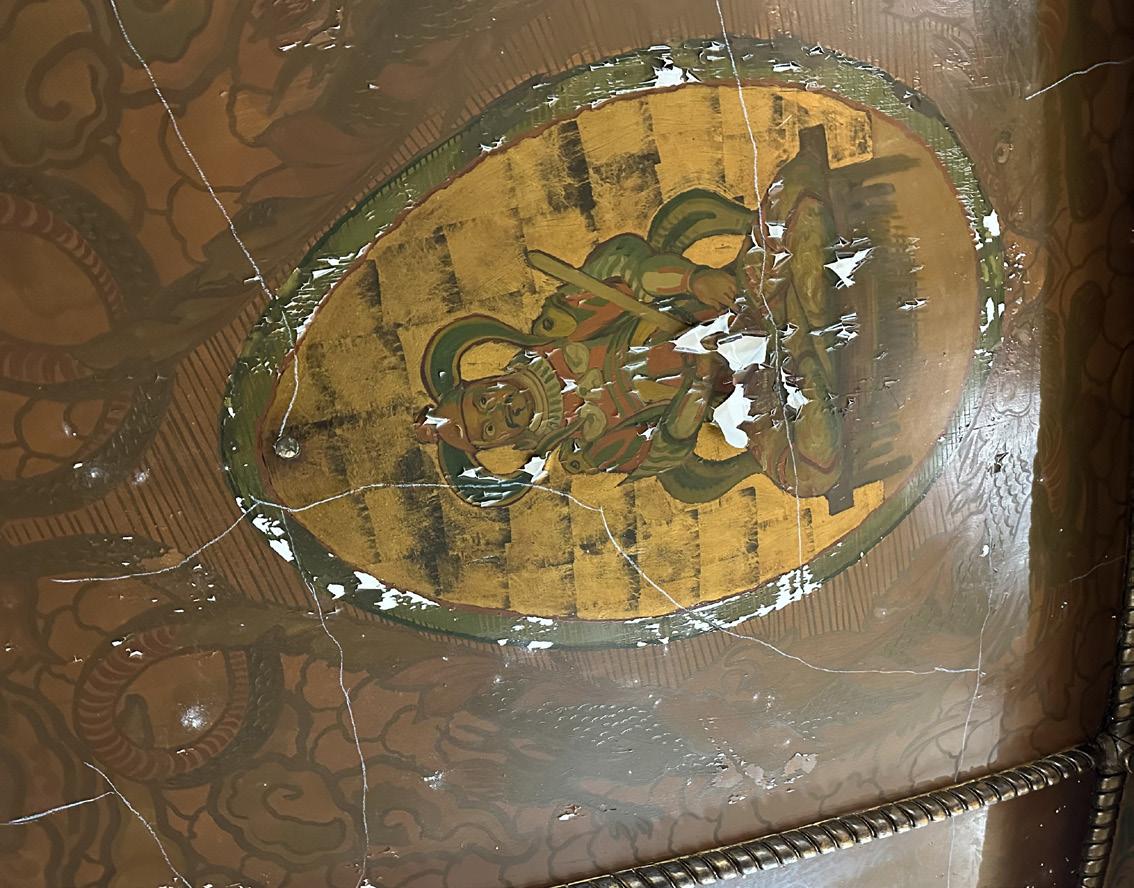
6 • Bay area reporter • April 11-17, 2024 t Jesus didn’t discriminate so neither do we. Come and see Dignity/SF, which affirms and supports LGBTQ+ folks. Catholic liturgy Sundays at 5pm, 1329 7th Avenue (Immediately off the N Judah line) dignity | san francisco Come for the service and stay for the fellowship. dignitysf@gmail.com for more details Instagram @dignitysanfrancisco † Facebook @DignitySF << From the Cover << Castro Theatre From page 1
Landes Dixon, venue manager for Another Planet Entertainment, led a hard-hat tour of the Castro Theatre last week.
Steven Underhill
Mary Conde, right, APE senior vice president, talks with people on a hard-hat tour of the Castro Theatre April 3.
Steven Underhill
The Castro Theatre’s ceiling has been badly damaged over the years.
John Ferrannini
Grant Miller, left, Joe Sangirardi, Mike Murray, and Bret Hendry took a hard-hat tour of the Castro Theatre renovations April 3.
Steven Underhill
PSR lecture offers spin on New Testament
by John Ferrannini
This year’s Boswell lecture at the Pacific School of Religion’s Center for LGBTQ and Gender Studies in Religion will be offering an interpretation of the intersection between sex and the Bible based in queer theory.
The Berkeley-based Protestant Christian seminary puts on the lecture. This year’s iteration, the 17th annual, “Why Do Biblical Interpreters Hate Sex So Much?” will be presented by Luis Menéndez-Antuña, a gay man who’s an assistant professor of New Testament at the Boston University School of Theology.
The lecture, which is free, will be Thursday, April 18, from 4 to 5:30 p.m. Pacific time. People interested in watching or listening should register in advance on the CLGS website where they can sign up for a Zoom link.
Menéndez-Antuña’s lecture questions the progressive interpretations of the New Testament, which, he said, often come about to affirm one’s own preconceived identity and conclusions.
“I’m very honored and pleased,” Menéndez-Antuña said in a recent Facetime interview. “I’ve been working on questions of queer interpretation for quite a while now and I’m very pleased to give this lecture particularly because these are issues with which many pastors, practitioners, and theologians struggle with, and also because for pastoral purpose, one of the consequences of this approach is in the life of the church ... a stronger awareness of the need for sex education, and what sex is and what sex does.”
The lecture is named for the late John Boswell, considered one of the founders of queer theology. An Episcopalian-turned-Roman Catholic theologian and Yale professor who focused on the intersection between homosexuality and Christianity in his studies, Boswell died of complica-

tions due to AIDS in 1994. In his work “Same-Sex Unions in Pre-Modern Europe,” Boswell famously wrote about an eighth century liturgical Greek manuscript featuring a sacramental union between two men – and wondered if this was, perhaps, a marriage ceremony.
Menéndez-Antuña will argue that progressive circles have maintained “Paul’s rather contemptuous stance on pleasure,” the CLGS website states, which have “morphed into less visible iterations – harder to identify and,
therefore, assuming more insidious postures.”
“Part of the assumption within progressive circles is we can go back to the Bible in order to retrieve historical information that will help us to be better to people, in a way,” Menéndez-Antuña said. “My argument goes against this trend because drawing against this trend, drawing from recent queer theory, sex is mostly a force that goes against identity formation.”
Menéndez-Antuña said he’s drawing from a strain of queer theory in-
augurated by the late academic Leo Bersani, who argued in his AIDS-era essay “Is the Rectum a Grave?” that “there is a big secret about sex: most people don’t like it.”
What people don’t like about sex, Menéndez-Antuña said, is that it deconstructs identity.
“Sex is a force that deconstructs the ego,” he said. “Humans tend to build identity on ego formation. I’m a teacher, I’m a husband, I’m a journalist, I’m a theologian, I’m a son: all of those are ego identifications, and his [Bersani’s] argument is sex is a force that chips away at identity formation, and instead of looking away from this destructive force, we should actually take it in the center of how we think of ourselves.”
The lecture will give four ways in which this intersects with the New Testament’s views of sexuality, some of which buttress identity and some of which deconstruct identity, but all of which should be read on their own terms, Menéndez-Antuña said.
“There’s not just one way to read the Bible in a queer way,” he said. “Instead of paying attention to those [passages] which reinforce where we are, we should pay more attention to the ones that deconstruct who we are.”
For example, “in the gospels, we see Jesus talking about asking the disciples to abandon their wives. That’s a good example in which a moral norm goes against the construction of identity. For many people, marriage was the foundation of their identity. In other cases, for example Paul talks about same-sex relations going against Christian identity because they’re an example of idolatry. In that case, moral forms reinforce identity rather than destroy it.”
Conservative theologians typically take the dissertation in St. Paul’s Epistle to the Romans chapter 1 as a blanket prohibition of homosexuality; progressive theologians typically argue it is a
reference to temple prostitution and pederasty, as the Bay Area Reporter previously reported in a story about a recent documentary that alleged a related passage of the New Testament had been mistranslated.
“Sexuality is an identity – gay, straight, lesbian, a plethora of identities – and his [Bersani’s] argument is that sex does away with those kinds of identities,” Menéndez-Antuña said. “That’s actually what I’m trying to point out at the end of the lecture – progressive circles try to take moral norms from the Bible to enforce the ego, when at the center is the negation of the ego.”
MCC pastor completed time at center, ED says
Bernard Schlager, Ph.D., associate professor of historical and cultural studies at the school and the executive director of the Center for LGBTQ and Gender Studies in Religion, told the B.A.R. that the Reverend Dr. Roland Stringfellow, who’d been the managing director of the center in 2023, has now left.
Stringfellow is the pastor of a Metropolitan Community Churches congregation in Detroit; Schlager was on sabbatical last year, as the B.A.R. previously reported. .
“Roland left CLGS at the end of December 2023 to move into full-time social work in the Detroit area where he has been living (and pastoring) for the past several years,” Schlager stated to the B.A.R. “CLGS is opening a search soon for Roland’s replacement as coordinator of the CLGS African American Roundtable; that was a part-time position held by Roland for many years. We miss him but are grateful for his 15-year connection to CLGS: first as a student and then as a member of our CLGS staff.”
Stringfellow did not return a request for comment.t

April 11-17, 2024 • Bay area reporter • 7 t Member FDIC Locations throughout California, with 15 in the Bay Area. 311 California Street • (415) 392-0642 2197 Chestnut Street • (415) 287-8800 699 Portola Drive • (415) 661-4800 In San Francisco: Proudly serving communities throughout California. At Tri Counties Bank, our breadth of financial services, local banker expertise and personalized problem solving provides a unique brand of Service With Solutions®. It’s about a team of bankers and financial specialists working together to help improve your financial success and well-being. Switch to better banking. Switch to Tri Counties Bank. Personal Banking Small Business Banking Commercial Banking 1-800-922-8742 | TriCountiesBank.com
Community News >>
Professor Luis Menéndez-Antuña, shown with Finn, his golden doodle, will be delivering the Boswell lecture at the Pacific School of Religion’s Center for LGBTQ and Gender Studies in Religion.
Courtesy Luis Menéndez-Antuña
Groundbreaking fetish artist Rex dies
by Cynthia Laird
Groundbreaking artist Rex, whose illustrations portrayed the preAIDS SM and fetish communities of San Francisco and New York City in the 1970s and 1980s, has died.
Rex, who only used one name, died in late March in Amsterdam in the Netherlands, according to a statement from the San Francisco-based Bob Mizer Foundation.
Using old emails from Rex, gay Bay Area resident Jack Fritscher, who founded and published the old Drummer magazine and worked with Rex for many years, deduced that Rex was 81. It’s believed Rex was born February 5, 1943, based on calculations Fritscher made this week and shared with the Bay Area Reporter.
Fritscher noted that on September 9, 2021, Rex wrote in an email to The Magazine store co-owner Bob Mainardi, who himself would pass away that December: “I had a Covid test and it was negative; basically just old age kicking in at 78.”
Further emails between Rex and Trent Dunphy, who was Mainardi’s husband, provided information about the month and day of Rex’s birthday, Fritscher stated.
Asked if Rex was a gay man, Fritscher stated that Rex identified as a leatherman “but he was a contrarian always and defied escalating labels.”
“Rex is to drawing in San Francisco and beyond what [Robert] Mapplethorpe was to photography in New York and beyond. Iconic, equal, and for the ages,” Fritscher wrote in an email to the B.A.R., referring to the late bi photographer who died of AIDS-related complications in 1989.
Dunphy, the historian at the Mizer foundation, who, with his late husband Mainardi owned and operated The Magazine for more than 50 years, stated that he and Mainardi met Rex when the artist came into their periodical and ephemera store in 1980, at the height of his career. Rex, Dunphy recalled, sought merchants who would be willing to sell his works.
“He was a great talker,” Dunphy stated. “One of my customers and I were talking and he liked Rex’s illustrations. He was 100% straight and said to me, ‘You know, I have his drawings and he’s really disturbing.
From page 1
Numerous organizations have already signed onto a letter requesting legislators adopt the bill. A copy of it can be seen online at https://tinyurl. com/4npx68ar.
“Failing to collect accurate SOGI data erases the LGBTQ+ community in public health policy and undermines the state’s efforts to ensure that all Californians receive the care and services they need. This oversight can have significant consequences for LGBTQ+ people, including increased stigma, misinformation, ineffective service provision, and a delayed response to public health emergencies like COVID-19 and the recent mpox outbreak,” notes the letter.
Ensuring such issues impacting the Golden State’s LGBTQ community, which in 2022 the Public Policy Institute of California noted was estimated to be at least 2.7 million LGBT people over the age of 18 or roughly 9% of the state’s adults, are a legislative priority for state leaders is behind the push for creating a Statewide LGBTQ+ Commission. It is the focus of Assembly Bill 3031 by Assemblymembers Alex Lee (D-San Jose), who is bisexual, and Evan Low (D-Cupertino), who is gay.
Their bill would establish a nineperson statewide advisory body. Five would be gubernatorial appointees, two would be selected by the Assembly’s speaker, and the remaining pair
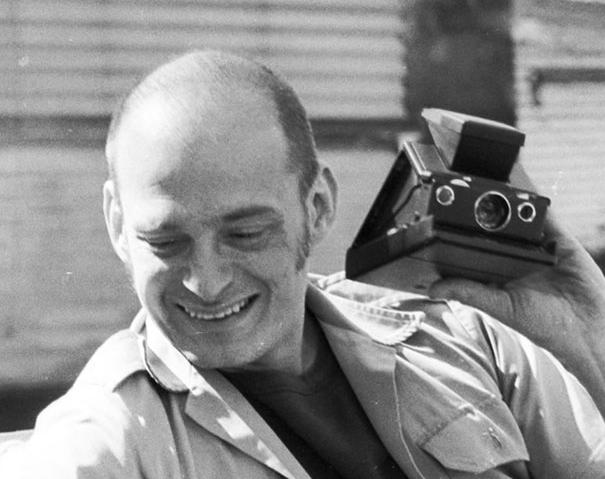
Why does he do that?’ I loved that and I told it to Rex, who responded, ‘That’s the point!’”
Rex was mum on his private life and did not like to have his photograph taken, Dunphy added.
“Benedikt Taschen (founder of publishing house Taschen) was visiting us one day and he held up his camera to take a picture of Rex, and Rex immediately put his hands up, and ruined Benedikt’s snapshot,” Dunphy explained. “He was a little pissed and he was adamant about that. He was very opinionated, and he was not shy about expressing it.”
Fritscher was able to take a photo of Rex in 1984. But he also agreed that the artist disliked being the subject of photographs.
“When I began writing about Rex in magazines like Drummer in 1978, editors always wanted a photo of the artist, who was famously camera-shy. I told them Rex said, ‘My drawings define who I am.’ So, in 1984, when Rex mentioned over lunch that he was having trouble drawing a tiny detail, he asked to shoot a Polaroid reference photo of my left wrist coming out the sleeve of my leather jacket. I said, ‘Sure, if you let me shoot you.’ He agreed. I aimed my camera. He was a trickster. He dodged, covering his face with his Polaroid camera, but I kept clicking and got the pictures editors wanted to document
would be named by the Senate Committee on Rules.
“It’s critical that the lived experiences of LGBTQ+ community members are recognized by our government,” stated Lee. “The commission will play an important role in informing policy and programs for the LGBTQ+ community. Creating the LGBTQ+ commission is another important step forward to ensure that everyone can live authentically and inclusively in our community.”
AB 3031 had its first hearing Tuesday before the Assembly Committee on Human Services where it was approved 5-0 with two abstentions. Among its backers is the South Bay LGBTQ political group BAYMEC, short for the Bay Area Municipal Elections Committee.
“Having a commission that addresses disparities facing California’s queer community and works to elevate our community’s unique experiences, voices, and concerns, is invaluable,” stated BAYMEC President Drew Lloyd. “BAYMEC enthusiastically endorses the creation of this Commission and looks forward to working with all stakeholders and our community to create a safe and unique space that leads to a better California for All.”
Another priority bill of the affinity group for out lawmakers is SB 959 by lesbian state Senator Caroline Menjivar (D-San Fernando Valley) that would create a resources website for transgender, gender diverse, and intersex (TGI) people and their families.

him historically.”
For many years, Rex lived and kept a studio in The Magazine building, which now houses the Bob Mizer Foundation, which was established to preserve the works of its namesake, the late gay physique photographer. Dunphy recalled that Rex’s workspace was decorated entirely in black.
Fritscher recalled a tragic incident when Rex was one of the artists famously burned out when the Barracks, a former bathhouse and BDSM space on Folsom Street, was torched in July 1981. (It had closed in 1976 and was being redeveloped into a hotel, according to an article in SF Weekly.) Rex lost all the original artwork in
It is aimed at combating misinformation and providing accurate information about access to trans-inclusive health care, existing legal protections for patients and health care providers, and other available support services for TGI individuals.
It passed out of the Senate Health Committee April 3 on an 8-1 vote with two abstentions and awaits a vote in the Senate Appropriations Committee on Monday.
“This bill will ensure that as TGI people and their families seek access to affirming health care and support, California provides comprehensive information and resources about access to trans-inclusive health care in the state,” noted Menjivar in her comments for an analysis of the bill.
With several minor earthquakes hitting the Bay Area and Los Angeles regions in recent months, along with devastating quakes that have struck Taiwan and Japan this year, disaster preparedness has once again been in the news.
Making sure the needs of LGBTQ people are taken into consideration when planning how to respond to earthquakes and other natural disasters is the focus of SB 990 by gay state Senator Steve Padilla (D-San Diego). His bill, which has support from gay Insurance Commissioner Ricardo Lara (D), would require the governor’s Office of Emergency Services, known as Cal-OES, to consult with LGBTQ+ organizations and community advocates on updating the State Emergency Plan by January 1, 2027, so it
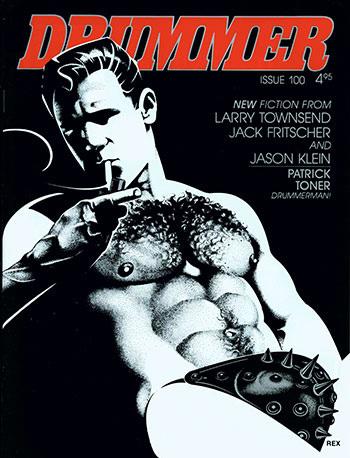
his home/studio on Hallam Street, a dead-end alleyway that fed into Folsom Street. Fritscher noted that Rex was not at home at that time, as he was meeting with B.A.R. leather columnist the late Mister Marcus at the Bootcamp to show Marcus his new ad/ drawing for that club.
Fritscher recalled he and Rex collaborated during the early years.
“I first wrote about him in Drummer in 1978 when we met, and we often collaborated,” Fritscher stated. “He drew an amazing original cover for my 1984 novel, ‘Leather Blues.’ Magazines would hire us as a package deal: he’d do a drawing and I’d write a matching story, or vice versa. In the 1990s, we collaborated on a feature-length video, which he advised while I directed and filmed, ‘The Rex Video Gallery: Corrupt Beyond Innocence.’
“He was a genius to work with and he was often misunderstood and hard
includes policies and best practices for how local governments and nongovernmental entities can equitably serve LGBTQ+ communities during an emergency or natural disaster.
“We’ve got to root out discrimination in our policies and our society,” stated Padilla. “The values we have fought so hard to uphold cannot disappear at the first sight of trouble. In the aftermath of a disaster, we want everyone to feel assured they are going to get the care they need to get themselves and their families back on their feet and into their homes.”
The bill is awaiting a hearing before the Senate Committee on Governmental Organization. It comes after UC Irvine released a report detailing how LGBTQ+ individuals, particularly LGBTQ+ people of color, are displaced at nearly double the rate of cisgender and heterosexual individuals because of natural disasters.
For instance, the study noted how fires displace LGBTQ+ people at twice the rate (30%) than non-LGBTQ+ people (14%) in California. It brought awareness to the fact that despite their best efforts to do so, state and federal agencies do not have clear strategies integrating LGBTQ+ people into their disaster preparedness, planning, and emergency response.
“While California has traditionally been at the forefront of LGBTQ+ civil rights, it has lagged in ensuring those rights are enforced during disasters,” stated UC Irvine assistant professor and Andrew Carnegie Fel-
to understand,” Fritscher recalled. “‘The Village Voice’ in 1975 called him a Nazi for drawing images of our vibrant leather culture.”
During his later years, Rex became disillusioned with what he saw as American society’s increasingly puritanical stance on artistic freedom, Dunphy noted.
“He thought American culture was crumbling and dysfunctional,” Dunphy stated, “so he moved to Europe.”
For those familiar with Rex’s career, it was no surprise that the artist wanted to live and work in a place where he could be truly free and live on his own terms, Dunphy stated.
“Bob and I both loved him,” Dunphy added. “You know, Rex once said that in order for something to be pornography, it has to be forbidden by society. That’s the key component. And that’s how he came up with his drawings.”t
low Michael Méndez, Ph.D., who authored the study. “This legislation is an important step in ensuring that the state provides guidance to local governments and mutual aid providers on safeguarding LGBTQ+ before, during, and after disasters.”
AB 1899 by lesbian Assemblymember Sabrina Cervantes (D-Corona) would require jury questionnaires used by state courts to ask prospective jurors about their preferred names and pronouns. It would also require that questions about jurors’ familial or personal relationships are phrased in a gender-neutral manner.
The Assembly Judiciary Committee passed it in March on a 10-2 vote. It is now pending before the Appropriations Committee.
“A summons for jury duty is one of the main ways that most individuals in California interact with our state courts. Unfortunately, there is no existing requirement that the written juror questionnaires used by superior courts during the voir dire process use terms that are inclusive of our LGBTQ+ community, especially nonbinary or transgender individuals,” noted Cervantes in her comments for the bill’s analysis. “Indeed, there are examples of juror questionnaires used by courts that ask prospective jurors about their gender in a non-inclusive manner or use gendered salutations. This sadly serves to potentially alienate members of our LGBTQ+ community even as they ful-
See page 10 >>
8 • Bay area reporter • April 11-17, 2024 t
<< Obituaries
In a rare instance, Rex was photographed in 1984. Jack Fritscher
Rex drew the cover image for Drummer magazine’s 100th issue.
Courtesy Jack Fritscher
A drawing by Rex Courtesy Bob Mizer Foundation
<< LGBTQ bills
Trans woman settles bias complaint with St. James Community
by John Ferrannini
The now-shuttered nonprofit that was part of San Francisco’s Our Trans Home program settled a race and sexual discrimination complaint earlier this year with a trans woman who alleges she was mistreated.
A request to withdraw the complaint filed with the state’s civil rights department January 25 shows that St. James Infirmary agreed to a $7,500 settlement to Lisa Willis, and the limited liability company associated with the Bobby Jean Baker House agreed to pay $3,000.
“A complaint was filed with the California Civil Rights Department (CRD); the settlement agreements were reached before the parties attended mediation with CRD. No lawsuit was filed,” Willis’ attorney, Hadley Rood with Bay Area Legal Aid, stated to the Bay Area Reporter. “We are proud of our client’s perseverance and were proud to represent her in this matter.”
This isn’t the first time a resident of the Mission district house – part of the city’s Our Trans Home infrastructure for addressing housing instability in the trans community – has complained about the alleged behavior of now-former St. James’ employees. The B.A.R. reported another resident complained of sexual retaliation last year.
Since then, the troubled nonprofit announced it was closing, as the B.A.R. also reported.
Its website states that it has been closed since December 29, 2023.
Victor Ruiz-Cornejo, a gay man who advises Mayor London Breed on LGBTQ policies, told the B.A.R. that the TGI Justice Project now holds the contract for the house. The TGI Justice Project has not returned multiple requests for comment for this report.
Allegations
Willis, a 54-year-old musician, told the B.A.R. that she had a difficult life growing up and had lived with her mother in Reno until the latter died in June 2021.
“I inherited a bit of money from her and decided to move out here,” she said, and after deciding to move to
Obituaries >>
William B. Reque
February 22, 1927 – January 12, 2024
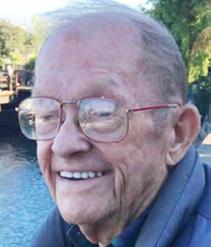
William B. Reque, a San Francisco resident for 71 years, died on January 12, 2024 at a hospital in Santa Rosa. He was 96. He was born February 22, 1927, in Wabasha, Minnesota, and grew up in Bayfield, Wisconsin, a fishing village on Lake Superior.
In 1945 he was drafted into the Army Air Corps and was stationed in postwar Germany and France. In 1947, he enlisted in the Army Counterintelligence Corps and served in Guam and Japan until 1950, when he was discharged from the military on grounds of homosexuality.
After working in Denver he moved to San Francisco in 1952, living in North Beach and working as a corporate accountant for major firms, including PanAm, Maersk, Harper Robinson, Dean Witter, and Kline Bros. He also tended bar at the Spaghetti Factory in North Beach and the Toolbox, a leather bar at Fourth and Harrison streets in the city’s South of Market neighborhood. He moved to Potrero Hill in the mid1980s with his domestic partner Carl Peterson, who died in 2009.
A longtime member of the Bay View Boat Club, he served as treasurer for several years. He is survived by a brother, John Reque, of Evanston, Illinois, and a sister, Karen Reque, of Fort Collins, Colorado.
the Bay Area went to an Extended Stay America in San Mateo County “which I thought was closer to San Francisco, but it’s way down there.”
It was there she tried to find a job and a permanent place to live. She then discovered the Our Trans Home program through internet research.
“I called them,” she said. “They ordered an Uber and picked me up. …
I was so desperate, I had nowhere else to go and I thought ‘I hope this isn’t a mistake.’”
Willis’ complaint was primarily against the particular employee who brought Willis into the program. The B.A.R. is not naming the former employee because it could not contact them.
After moving into the Bobbie Jean Baker House in November 2021, Willis said things started out well.
“It’s such a beautiful house. I thought it was a dream,” she said. “You first get there and it’s almost like you’re a queen and then it drops off at a certain point; you can’t get [the employee] to return your messages. ... These people come and they seem so wonderful, and it turns into something terrible.”
The “something terrible” started with an unrequited romance with a fellow housemate, who Willis suspects was using her for assistance because
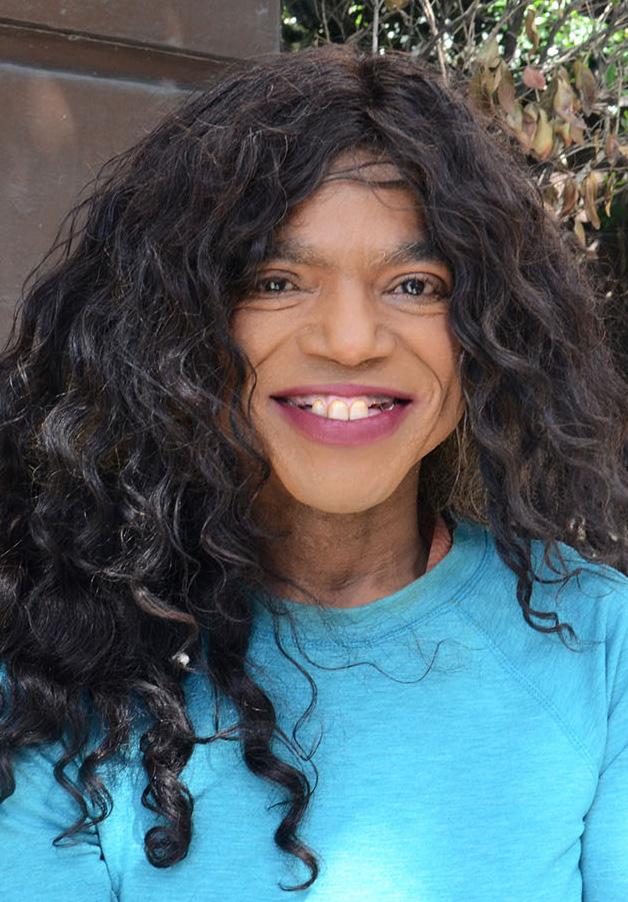
the housemate was recovering from top surgery.
The realization that the feelings Willis had for the housemate were unreciprocated crushed her, she said.
“I took care of her. Now at this point, I was in love with her,” Willis said. “Maybe I didn’t respond to it as maturely as I could have. But once that played out ... I am now very upset, talking to [the employee], my thera-
pist; I’m heartbroken.”
It was at that point the employee allegedly said to Willis, who is Black, that “Black people seek relationships with white people for respect and you don’t need [the housemate] to gain respect,” Willis recalled.
“It was her personality – what I thought it was – that attracted me to her,” Willis said, not the housemate’s race. “I made quite a bit of noise.”
Then on September 24, 2022, Willis was attacked on the 14-Mission bus, she said, resulting in a spinal cord injury.
“I forgot to cover my voice to sound more like a woman,” she said. “A woman sprayed a can of bug spray in my face, then a woman hit me in the head. She seemed wanting to fight but I’m not a fighter. What I did was run.”
The San Francisco Police Department was “unable to locate a police report with the information provided,” a spokesperson stated, though Willis said she filed one.
Willis became afraid to leave the house for fear of being attacked again. In November 2022, after having filed several grievances, the employee decided that Willis should leave, Willis claimed.
“[The employee] claimed it was because my room was messy,” Willis said.
“It wasn’t really as messy as they said,” she added, but she conceded that having been injured, she has difficulty picking up things.
“[The employee] threw away all my stuff,” she said.
Some St. James employees were upset that Willis had to leave and helped her secure housing at the Hummingbird Navigation Center.
“They got me in there,” Willis said. About a month later, she moved to Lower Nob Hill, where she currently lives. Willis said she is currently looking for work that she can do with her injury and is on County Adult Assistance Programs.
Ruiz-Cornejo told the B.A.R. that as there isn’t an active executive director of the city’s Office of Transgender Initiatives – under which Our Trans Home is housed – “myself and the city administrator’s office are jointly overseeing the department during this time.” The most recent executive director, Pau Crego, departed in December, as the B.A.R. reported. St. James Infirmary’s website contains an email address where people can request records; the B.A.R. reached out to this email but did not receive a response. The B.A.R. also contacted the employee, who did not return a request for comment.t

April 11-17, 2024 • Bay area reporter • 9 t This resource is supported in whole or in part by funding provided by the State of California, administered by the California State Library in partnership with the California Department of Social Services and the California Commission on Asian and Pacific Islander American Affairs as part of the Stop the Hate program. To report a hate incident or hate crime and get support, go to https://www.cavshate.org/.
News >>
Lisa Willis received a settlement from the former St. James Infirmary.
Rick Gerharter
fill one of their obligations as citizens of the United States.”
Another bill related to legal matters is AB 1979 authored by gay Assemblymember Chris Ward (D-San Diego) that is known as the Doxing Victims Recourse Act. Doxing is the release of an individual’s private information online, such as their home address and phone number.
It is a tool utilized by online trolls against their critics, with transgender individuals often being doxed when they speak out against transphobic legislation or policies.
The bill would allow a victim to pursue civil action to receive restitution for the harms endured as a result of being doxed. It passed out of the Assembly Judiciary Committee April 2 on a 10-1 vote and awaits a hearing at appropriations.
Under SB 1491 by lesbian state Senator Susan Talamantes Eggman (DStockton) the California Student Aid Commission would have to provide, beginning with the 2026–27 school year, written notice to college students who receive state financial aid if their postsecondary educational institution has an exemption from either the Equity in Higher Education Act or Title IX on file with the commission.
Often religious-based colleges seek exemptions in order not to comply with providing protections covered by the rules to LGBTQ students on their campuses. The state commission currently is only required to post which schools have exemptions online.
For state-run colleges and universities, they would need to designate a confidential point of contact on their campuses for lesbian, gay, bisexual, asexual, pansexual, transgender, gender-nonconforming, intersex, and two-spirit faculty, staff, and students. It also would task the Legislative Analyst’s Office with auditing the state’s community colleges and four-year colleges and universities with respect to the quality of life for their LGBTQ students, faculty, and staff.
SB 1491 passed out of the Senate
If valid requests then the recount would begin Monday, according to the story.
Stegink told the Los Gatan he had no intention of paying for a recount himself and thought the two county governments should chip in for it.
“Let’s have full transparency and take a look,” he told the local newspaper.
Low is vying to be the Bay Area’s first gay congressional member. His campaign blasted Liccardo in a statement and called out Padilla for seeking a recount.
In a statement from an unnamed spokesperson emailed to the media, though Politico reported it came from Whitney Larsen, Low’s campaign stated, “This is a page right out of Trump’s political playbook using dirty tricks to attack democracy and subvert the will of the voters. Sam Liccardo, who does not live in the district, did not file a recount himself. Instead, he had his former staffer do it for him. What’s he afraid of?”
(House members are not required to live in the district they represent.)
In a terse statement to KQED, Liccardo’s campaign said it had not made the recount request and would not comment on Padilla. The public broadcaster reported that Padilla served as the finance director on Liccardo’s 2014 campaign for mayor and gave him $1,000 in December for his House bid.
“The Liccardo campaign would like to thank the tireless work by the election officials and volunteers whose dedication and labor make our elections fair and trustworthy,” the spokesman said in a statement. “Every vote should be counted, and that’s why recounts are part of the state’s electoral process to ensure accuracy.”
Education Committee April 3 on a 4-2 vote with one abstention. The Senate Judiciary Committee will hear it April 16.
“Institutions of Higher Education need to be able to provide and better protect the rights of LGBTQ+ students and faculty. This bill compels the transparency of private colleges by written notice and gives public colleges a more active role in providing resources to LGBTQ+ students,” stated Eggman, who wrote the bill in response to the findings of a report released this year by the Assembly Higher Education Committee.
Health bills cover myriad concerns
Gay Assemblymember Rick Chavez Zbur (D-West Hollywood/Santa Monica) has championed LGBTQ health issues during his freshman term. He has authored a trio of bills this year aimed at improving the health outcomes for LGBTQ Californians.
His AB 2258 would codify longstanding federal guidance that health plans and insurers must cover services that are integral to providing recommended preventive care – including anesthesia and polyp removal during a colonoscopy; placement, management, and removal of longacting reversible contraceptives. They would also need to provide without cost sharing ancillary and support services for PrEP, the HIV prevention medication, including screening for HIV and other sexually transmitted infections. Newsom vetoed a similar bill by Zbur last year, as the B.A.R. reported at the time.
Various medical boards in the state would need to expedite medical licensure for gender-affirming care under Zbur’s AB 2442. And his AB 2477 would update state law to clarify that young adults can accumulate cash savings while in foster care.
AB 2258 awaits a hearing before the Assembly Health Committee, while AB 2442 passed out of the Assembly Business and Professions Committee Tuesday on a 13-1 vote with four abstentions. AB 2477 passed out of the Assembly Human Services Committee 7-2 on April 2 and is now before
Simitian’s campaign had yet to respond to media requests for comment as of early Tuesday evening.
Following the certification of the tied vote April 4 by elections officials in both counties, Low had stated he was “honored to have won the support of our community to advance to the general election to replace the esteemed Anna Eshoo for Congress. Thank you to all of my incredible supporters who gave their time, money, and votes to support our campaign.”
Low added of the “historically close race” that is showed how “every vote really counts. I could not have made it this far without every one of you, and I hope to earn your support once again in November.”
In announcing her certification of the primary election results, Santa Clara County Registrar of Voters Shannon Bushey noted, “The results of this election exemplify why your vote truly matters.”
Other close races
The Bay Area congressional race was one of several primary contests with LGBTQ candidates across the Golden State that took weeks to determine due to razor-thin vote margins. It wasn’t until March 28 that bisexual Riverside City Councilmember Clarissa Cervantes declared victory in her race for an open Assembly seat.
Cervantes took second place over fellow Democrat Ronaldo Fierro by 202 votes. In November, she will compete against Republican Leticia Castillo, who placed first in the primary, for the 58th Assembly District seat that spans Riverside and San Bernardino counties.
“I want to extend my deep gratitude and appreciation to my daughter, my family, my dedicated team, our tremendous volunteers, and every labor union and organization who stood
the appropriations committee.
“LGBTQ+ Californians continue to experience significant disparities in measures of health and wellbeing compared to the general public,” noted Zbur. “These bills ... all help close those disparity gaps by increasing healthcare access for transgender and gender non-conforming people, enhancing consumer protections for preventative care for HIV and other conditions, and helping former foster youth obtain the support services they need to live independently to reduce the risk of homelessness. They are about lifting up and supporting our most vulnerable.”
Eggman’s SB 1333 would require state and local health department employees and contractors to annually sign confidentiality agreements prior to accessing confidential HIV-related public health records. Currently, they just sign it once then the state or local health department is to yearly review the agreements.
The bill also authorizes disclosure to other local, state, or federal public health agencies or to medical researchers when confidential information is necessary for the coordination of, linkage to, or reengagement in care for the person. It passed out of the Senate Health Committee in March and the Senate Judiciary Committee voted 11-0 for it Tuesday.
Eggman authored it to address issues that came up during the recent mpox outbreak, where state confidentiality laws prevented health providers from noting in patient records if someone who contracted mpox was also HIVpositive, thus potentially impacting the care the person needed. It has also been an issue with people living with HIV who have other comorbidities, such as other STIs or tuberculosis.
“This bill will improve California’s ability to ensure timely, quality health care for people with HIV and other reportable communicable diseases,” stated Eggman.
AB 3161 by Assemblymember Mia Bonta (D-Oakland) requires hospitals to analyze patient safety events by sociodemographic factors, like race, ethnicity, language, sexual orientation, and disability status. Known as
with us and believed in my candidacy,” stated Cervantes. “Thank you for standing with me. I am ready to champion the needs of our communities in Sacramento and ready to deliver lasting results for the Inland Empire.”
If victorious, Cervantes will be one of the Golden State’s first bisexual female legislators. She would also succeed her sister, lesbian Assemblymember Sabrina Cervantes (D-Corona), who is favored to win her November 5 race for the open Senate District 31 seat against GOPer Cynthia Navarro. The Cervantes sisters, who are both moms, would be the first pair of LGBTQ siblings to serve together in the California Legislature. Of the two, Clarissa Cervantes is likely facing the tougher fall campaign.
Castillo and Republicans likely will continue hammering her over being arrested last year for drunk driving weeks after a judge had dismissed her DUI conviction from 2015. Cervantes has been sober for more than seven months now, per a campaign spokesperson, and was one of several Democratic candidates who overcame DUI headlines to win in March.
State Senator Dave Min (D-Irvine) also faced attacks stemming from his DUI arrest last in Sacramento. Nonetheless, he survived his March 5 contest for an open U.S. House seat in the heart of Orange County and is competing in November against former Republican Assemblymember Scott Baugh of Huntington Beach.
Min’s campaign blasted Baugh April 4 over his benefitting from an April 3 fundraiser in Newport Beach with Republican House Speaker Mike Johnson of Louisiana. It signaled how their race “is ground zero in the fight for the House,” stated Min campaign spokesperson Amelia Matier. “Baugh’s connections to white nationalists and
the Equity in Health Care Act: Ensuring Safety and Accountability, the bill aims to bring to light the disparities in health that communities of color and LGBTQ communities are facing.
Additionally, AB 3161 requires hospital safety plans to include a process for addressing racism and discrimination and its impacts on patient health and safety. It passed out of the Assembly Health Committee Tuesday on a 15-0 vote with one abstention.
After stalling out last year in the Senate Appropriations Committee, where it remains, AB 518 has been revived by Assemblymember Buffy Wicks (D-Oakland). It would extend paid family leave to cover a worker’s chosen family, the term LGBTQ people and others use for individuals they care for and rely on who are not their biological family or spouse.
Another bill pulled last year that has been brought back is Menjivar’s SB 729 that would require large group health plans to provide coverage for fertility and infertility care, including IVF, and updating the definition of infertility to be inclusive of LGBTQ+ family planning experiences. It awaits action in the Assembly.
Housing bills
With housing stability tied to a person’s health outcomes, Zbur’s AB 2498 aims to prevent a wide range of individuals, from former foster youth, older adults, and adults with disabilities to people unemployed or who were recently incarcerated, from losing their housing. Known as the California Housing Security Act, the bill would provide rent subsidies to the various rent-burdened populations. It awaits a hearing before the Assembly Housing and Community Development Committee. Passing out of that committee in March 7-0 was AB 2007, which would establish the Unicorn Homes Transitional Housing for Homeless LGBTQ+ Youth Program.
Authored by Assemblymember Tasha Boerner (D-Encinitas), Ward and Zbur are co-authors, along with gay Assemblymember Corey A. Jackson, Ph.D., (D-Perris). If passed and funded by the Legislature, AB 2007 would
his backing by groups against abortion and LGBTQ+ rights fit right into Johnson’s MAGA Congressional playbook.” They are seeking the District 47 seat being vacated by Congressmember Katie Porter (D-Irvine), as she lost her primary bid for the U.S. Senate seat that for years had been held by the late Senator Dianne Feinstein. After her death last fall, Democratic Lesbian U.S. Senator Laphonza Butler was appointed to fill the vacancy by Governor Gavin Newsom.
Butler opted not to seek a full term this year and will step down shortly after the November 5 election. Congressmember Adam Schiff (D-Burbank) is expected to easily win the seat over his GOP opponent, retired baseball star Steve Garvey.
The state’s current two gay congressional members, Democrats Mark Takano of Riverside and Robert Garcia of Long Beach, both represent Southern California districts and are expected to easily win reelection in November. They both had endorsed Low in his primary race.
But as he is seeking a safe Democratic seat that will not factor into if Democrats retake the House this year, Low will not have the same party advantages if he makes it to November as gay congressional candidate Will Rollins will have in his bid for a House seat in the Palms Spring area. Rollins is aiming to oust from office conservative Congressmember Ken Calvert (R-Corona) from his 41st Congressional District seat.
His race is seen as a possible pickup for the Democrats, and unlike when he first ran against Calvert in 2022, Rollins has received early backing and support from his party since he launched his campaign last year. Last Thursday Rollins announced raising over $1.8 million in the first three months of 2024.
His campaign noted it is the single-
establish a three-year pilot project expansion of the Unicorn Homes Transitional Housing for Homeless LGBTQ+ Youth Program in up to five selected counties.
It would train LGBTQ+ affirming households willing to host LGBTQ+ identifying youth experiencing homelessness due to being rejected by their family. It passed out of the Assembly Housing and Community Development 7-0 in March and is now before the Assembly Human Services Committee.
According to the bill analysis, its cost is currently unknown.
“The bill promotes housing stability and a positive support system that helps transition LGBTQ+ youth experiencing homelessness to permanent housing either as independent adults, or by reuniting with their family,” argued Boerner.
Newsom last year had vetoed Boerner’s AB 589 that called for establishing such a housing program in Sacramento and San Diego counties due to fiscal concerns. With the state facing a budget deficit that could total $73 billion, AB 2007 likely could face the same fate if it makes it to the governor’s desk.
Another bill Newsom vetoed last year over its estimated $4 million price tag to implement is now back before the Legislature. Menjivar’s SB 954, known as the Youth Health Equity and Safety (YHES) Act, would expand public school students’ access to condoms.
It passed out of the Senate Education Committee in March on a 5-2 vote and is now before the Senate Health Committee.
A bill that should sail through the Legislature this year is SB 1278 by gay state Senator John Laird (D-Santa Cruz). It would enshrine December 1 in California as World AIDS Day, a day globally recognized in solidarity with people affected by HIV.
If SB 1278 is adopted, the state’s governor would need to annually declare that date as World AIDS Day. The Senate Governmental Organization Committee will take up the bill on April 23.t
highest fundraising quarter ever for a candidate running against Calvert. Rollins is also reporting having more than $3 million cash on hand as he ramps up his fall campaign.
“The contrast in our race could not be clearer, and that’s demonstrated by our continued fundraising success,” stated Rollins. “Voters in California’s 41st District know that 32 years of Ken Calvert is far too much. It’s time to turn the page from his decades of corruption and MAGA extremism and bring in new leadership that works across the aisle to get things done for Riverside County. Together, we are going to win this race and deliver a pro-democracy and pro-working family agenda for the people of our district.”
Two other gay Democratic congressional candidates are mounting rematches this year and have not gotten the same party support as Rollins has received. Progressive lawyer David Kim aims to oust from office Congressmember Jimmy Gomez (D-Los Angeles) from his District 34 House seat to become the first out Korean American elected to Congress.
Progressive activist Derek Marshall is seen as the underdog in his race against Congressmember Jay Obernolte (R-Hesperia) from his District 23 House seat in the high desert country east of Los Angeles.
In the East Bay race to succeed outgoing Congresswoman Barbara Lee (D-Oakland), who also lost her primary bid for Feinstein’s former Senate seat, queer candidate Jennifer Kim-Anh Tran, Ph.D., is also seen as the underdog against fellow Democrat Lateefah Simon. The BART board member took a commanding lead in their primary race for the District 12 House seat and is expected to easily win it come November 5.t
10 • Bay area reporter • April 11-17, 2024 t << Community News
<< Low From
1 << LGBTQ bills From page 8
page
 by Jim Gladstone
by Jim Gladstone
Offered a time machine ride that could only take you back four years, you might be inclined to shrug off the opportunity.
But in “Kristina Wong, Sweatshop Overlord,” the titular, jocular, Inner Sunset-raised performance artist’s latest solo show, now playing at A.C.T.’s Strand Theater, that short hop feels shockingly epochal.
Wong recounts the origins and evolution of the Auntie Sewing Squad, a nationwide alliance
‘Kristina Wong: Sweatshop Overlord’
of primarily female volunteer mask-makers she spearheaded as a way to generate both solidarity and self-empowerment in the face of the coronavirus and its societal reverberations.
Her funny, loose-jointed agit-pop monologue offers plenty of worthy and touching – if unsurprising – takes on Trumpism, racism, community building, and cross-generational rapprochement.
But its most powerful impact comes from plunging audiences back into the morass of the COVID-19 pandemic: The show delivers an unnerving reminder of how coolly and quickly we’re encouraged to move along these days, trained
by media and politicians to process and discard trauma at 5G speeds.
Wong, who opens the show in neutral coveralls but soon transforms into a bare-shouldered Day-Glo social justice Rambo (The costumes are by Linda Cho; the clever flipping of anti-Asian Stallone machismo into humane generosity is classic Wong), summons up the nerve-shredding early days of the coronavirus’ scourge.
Sharing well-honed anecdotes amid a soundscape of alternating sirens and silence (by Mikhail Fiksel and Adam Salberg), she elicits powerful sense memories of the frustration, anxiety, alien-
 by Brian Bromberger
by Brian Bromberger
To those who think history is boring or period dramas are stuffy, I offer the new seven-episode limited series, “Mary & George,” streaming now on Starz, as a counterargument. This series is probably the gayest, bawdiest one ever screened on TV, making last year’s steamy “Fellow Travelers” seem like a Walt Disney production by comparison.
This thrilling British history raises carnal intrigue and scheming within a monarchy to new
heights of audacity and salaciousness. We’re a long way from refined Merchant Ivory costume literary adaptations, especially with the series’ liberal use of indecorous vulgar language, more reminiscent of Yorgos Lanthimos’ “The Favourite.” The predominance of lusty queer sex puts “Mary & George” in a category of its own, undoubtedly causing Jane Austen to turn multiple rotations in her grave.
Plum role
As executive producer, Julianne Moore found a plum role as the ambitious, conniving, manipulative Mary Villiers, who plots to land her second-
born (“He will merit nothing of human value”) handsome, sultry son George (Nicholas Galitzine, the dumb quarterback in “Bottoms” and the English prince in “Red, White, & Royal Blue”) into the royal bedchamber of King James I (Tony Curran).
He’s the bisexual Jacobean English/Scottish ruler, who likes beautiful young men, an open secret whispered throughout the land. He’s described by Mary’s second husband, Lord Compton, as a “dead-eyed, horny-handed horror who surrounds himself with many deceitful, wellhung beauties,” and by Mary herself as “so cockstruck it’s like a curse.”
ation, and helplessness that swept over us beginning in the spring of 2020.
They hit as a surprise, “Oh, wow, that was just a minute ago!” reminders of a time at once recent and ancient. It’s creepy and alarming how easily we can lose track of ourselves.
The fact that Wong actively did something in response to the pandemic rather than passively allow it to wash over her in waves of cable news and sweatpantsed indolence gave her a better, stronger sense of herself and her agency.
Mary sends George to France to tutor him into an aristocratic gentleman well-versed in the courtly arts of speaking French, fencing, dancing, and screwing, all furthering his education of enticing men. She also acts as a pimp to make sure George ensnares James, but he has a rival in James’ favorite lover, the Earl of Somerset (Laurie Davidson), who’s willing to fight to the death to maintain his position(s).
George becomes his enemy, but with Mary’s help, they enact a cunning plan that is risqué as well as risky, not only to seduce James, but permanently replace Somerset. George is trained both as consort and as a megalomaniacal diplomat, leading to his downfall.
Poison prunes
Meanwhile, Mary must find a wife for her mentally unstable older son John, build up her personal fortune so as not to be dependent on her disapproving husband, and pursue a lesbian affair with a brothel keeper (Niamh Algar) whom she passes off as her lady-in-waiting/servant.
Along the way there are alliances, betrayals, murders with poisoned prunes, orgies and an overall bonk-fest, the usual dysfunctional family dynamics, not to mention a potential war with Spain. All this intrigue marinates in spiky humor with added irreverence and anachronisms making it scrumptious for contemporary audiences.
The first half of the series, which is more titillating and calculating, reveling in its debauchery, with a bevy of secondary vibrant characters, plays better than the less intense, more serious latter part which follows the template of tawdry historical fiction, focusing more on the main protagonists intertwining with international events. It’s the story of a monstrous family, desperate to improve their social standing at any cost, constantly repeating their mantra, “Bodies are just bodies,” which can be both exhilarating and exhausting to watch.
Ripe and ribald
There’s a huge quota of sex here, overblown but gripping, giving Starz’s intimacy coordinators lots of employment, though because of the dark lighting (reminiscent of a Caravaggio painting) it can be hard to discern naked bodies and which carnal act they’re performing.
An inspiring agit-pop monologue at the Strand
Kevin Berne
Starz series’ royal bed-hopping antics Oh, ‘Mary & George’! Rory Mulvey/Starz, Sky UK
page 14 >>
page 15 >>
Julianne Moore and Nicholas Galitzine in ‘Mary & George’
See
See
Caravaggio, queer glances, and pictorial piazzas

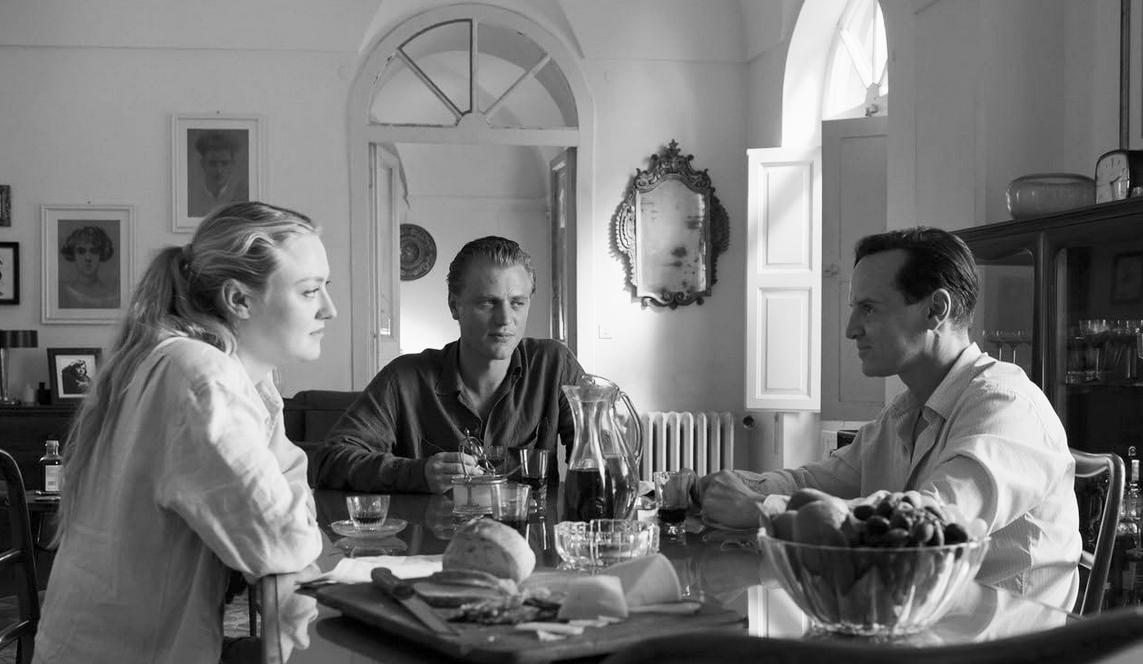 by Joshua Polanski
by Joshua Polanski
Patricia Highsmith’s confounding Tom Ripley is no stranger to screen adaptations. The mysterious and perhaps repressed bisexual con man has been front and center of several interpretations.
The new eight-episode limited series from Netflix stars the beloved Andrew Scott fresh off “All of Us Strangers” in a dark, calculating, and alluring run at the character. The series adapts the Richard “Dickie” Greenleaf affair that trots all across Italy from the first novel.
Hired by Dickie’s very wealthy father to venture from New York City to Atrani, Italy to convince Dickie (Johnny Flynn) to put an end to his endless life of leisure abroad and return home, Tom, a professional swindler with a plethora of fake identities, immediately seizes the opportunity to substitute his own legal issues in New York with adventure abroad.
He and Dickie grow close – or, at least Tom makes sure to impose himself until they appear to others as dear friends – and this drives a wedge between Dickie and his fiancée Marge Sherwood, who Dakota Fanning plays perfectly with her inquisitive eyes and concealing face. The men’s closeness bubbles into trouble before taking a spin into a deceitful web of murder, art theft, and forgery.
Art, Art, & More Art
Set in high bourgeoise Italy of the 1960s, visual art of all sorts seems to stalk and surround Tom in the world. Gargoyles, saintly statues, and Dickie’s amateur paintings barely touch the surface.
Writer and director Steven Zaillian (“All the King’s Men”) returns with frequent interest to the statues of Catholic saints and biblical characters. More important than the statues are Picasso and especially Caravaggio, the latter of
whom can’t be ignored as an artist of homoerotic depictions and who, like the criminal at the center of Highsmith’s novels, tried to evade the authorities as a murderer. His paintings set the tone for “Ripley” and reverberate in the showrunner’s decision to shoot the entire series in a sultry black and white.
Zaillian almost convinces the viewer to see Tom through a Caravaggio-esque perspective of a tortured, sexually repressed, and mythological artist. The sensational and detailed landscapes look not like the black and white films of the ’60s (or earlier) but more like the crisp digital black and white one might find in a catalog of contemporary street photography from Magnum Photos. The camera trails, leads, and occasionally observes Tom as he traverses through scenic Italy like the main subject in a painter’s canvas in avoidance of consequence. The world nev-
er outgrows Tom. Scott imbues the character with the right balance of self-importance and real importance so that he always feels like the center of an artist’s creation. He’s the David to Samuel, the human focal point in a cityscape.
Surreptitious sexuality
There is something innately queer to Tom’s surreptitious performance as a friend to Dickie. But, like most other interpretations of Highsmith’s Ripley, his sexuality is only implicit even if his obsession with other men moves into jealousy and dressing in their clothes. Marge certainly thinks he’s gay and warns her fiancé of her suspicion, as if the information corroborates her other claims about Tom’s shady character. The only onscreen male-onmale kiss comes from a corpse, so it doesn’t really count as queer. Physical intimacy of any kind is rare in this cold world.
The sexually-charged glances all of the characters share, especially in the first few episodes, could be construed through a free-flowing queer sexuality if one squints enough. The last episode blurs these the best with Marge coming unexpectedly close to flirting with Tom.
Of course, as a work of the famed lesbian writer Highsmith, Tom Ripley can never stray too far from queer interpretation and interest. The show honors this with a cast that challenges heteronormativity. Scott is a gay man, and Sumner is the non-binary child of Sting and the actor Trudie Styler. In a glance abundant conversation in the fifth episode, these two queer individuals deliver one of the best and most tense television scenes since the conclusion of “Game of Thrones.” It might also be the best hour of television since then.t
www.netflix.com







<< Mary & George
From page 13
Mostly the sex is not gratuitous, but transactional, used as currency to get ahead and move the plot forward. It can be described as tastefully explicit. Many of the characters one could characterize as sexually fluid, having both straight and queer partners. Moore is magnificent, thrilling to watch, in that Mary could’ve been unidimensional, but despite her evil manipulations, Moore makes us realize that as a woman forced to live through her husband and sons (speaking to George: “If I were a man and I looked like you, I’d rule the fucking planet.”), she maintains her self-preservation at all costs so she could survive in James’s unpredictable court. She was forced to forge ahead regardless of the consequences, though she has soft-hearted moments with her lady-in-waiting and her feeble son. Galitzine certainly looks the part –
few actors play gorgeous better than him – especially when George is brooding or pouting. He has the widest arc, going from naif to a foreign minister corrupted by power. He’s fine here, but his talents are limited. Unlike Moore, who in her physical expressions can suggest various panoplies of contradictory feelings, with Galitzine there’s little emotional depth, aside from desperate ambition, though he exhibits a modest comic flair in his banter with Moore.
Davidsen as Somerset is a hoot to observe with his cunningness, plus sexier than Galitzine. Curran with his mercurial, emotionally vacillating moods yet revealing a need for tender love, steals every scene he’s in.
“Mary & George” is history at its gayest. It’s also refreshing not to rehash the Tudor dynasty (Henry VIII and Elizabeth I) and center on a lessknown monarch. Still, this is really Mary’s story with mother knowing best, and viewers will be rooting for her, despite her cutthroat tactics. With
all the wealth and power that the characters accumulate through their sordid machinations, you can’t help wondering at the end if they’re any happier or wiser.
Loaded with mordant humor, the series never takes itself too seriously, being edgy and invigorating, until the end when it starts to get stale, but you’ll have a blast until then, appreciating the handsome production design and visual sumptuousness, plus incisive direction by the gay South African director Oliver Hermanus (“Beauty,” “Living”) aided by a cheeky script by gay British playwright D.C. Moore (“Killing Eve”).
Bodies may be just bodies, but all the horny frolics will delight LGBTQ viewers while simultaneously horrifying them in this scintillating seedy spectacle. We guarantee you will never look at a King James (yes, the identical one!) Bible in the same way ever again.t
14 • Bay area reporter • April 11-17, 2024
t << TV
of Laughter and
GATEWAY THEATRE WRITTEN BY STUART ROSS MUSICAL CONTINUITY, SUPERVISION, AND ARRANGEMENTS BY JAMES RAITT DIRECTION AND MUSIC DIRECTION BY DANIEL THOMAS
415-255-8207 42ndstmoon.org Full
Four-Part Harmony! April 18-May 5
www.starz.com
Left: Andrew Scott in ‘Ripley’ Right: Dakota Fanning, Johnny Flynn and Andrew Scott in ‘Ripley’
Both photos: Netflix
Tony Curran (center) and Nicholas Galitzine (right) in ‘Mary & George’
Rory Mulvey/Starz, Sky UK

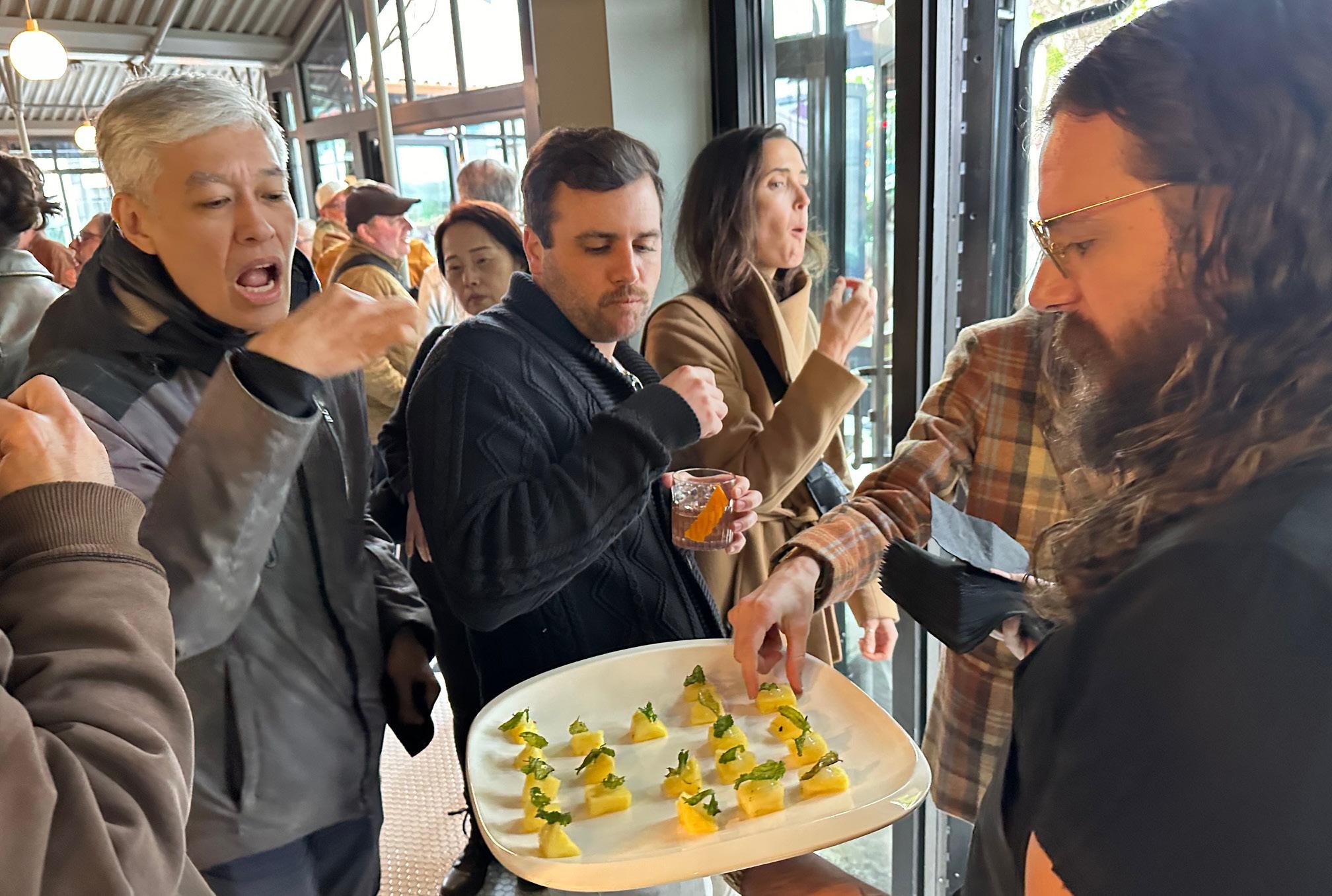
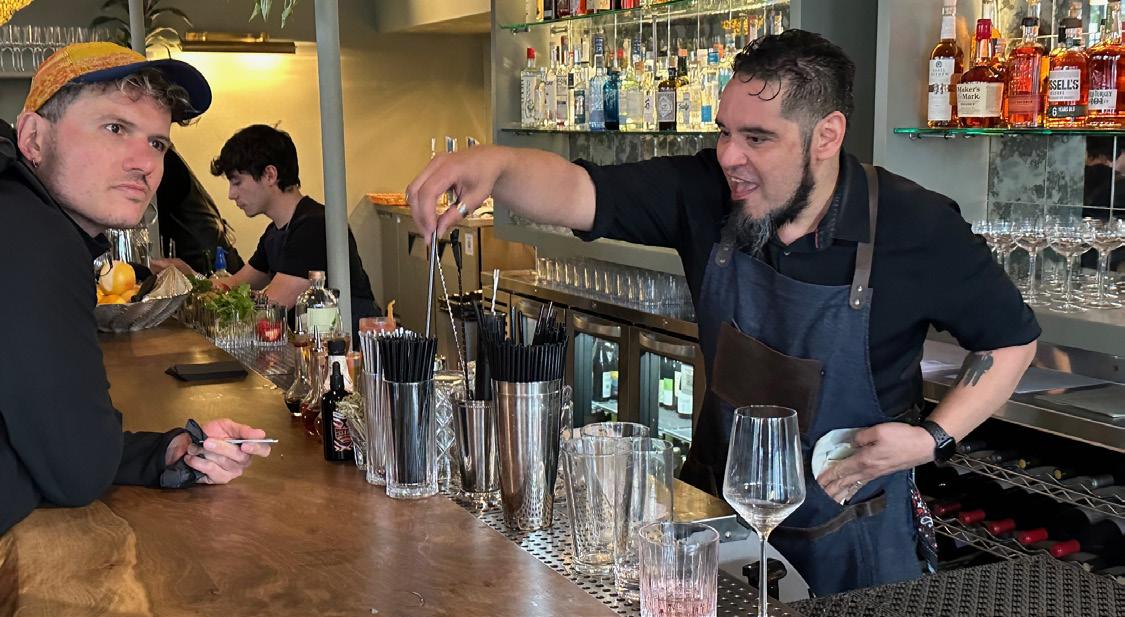

<< Kristina Wong
From page 13
Expanding corps
In turn, she shared that sensibility with friends, family, and an organically expanding corps of folks who, yes, made masks, but more importantly made meaning for themselves during a crisis that was existential as well as medical. (Those masks –sewn from bra straps and fabric scraps – likely had much more value as totems than PPE).
The entire show is a grand extension of the sewing circle that inspired it. Attempting to create value in the face of the world’s challenges, trying to make sense to make progress, asserting the self in the hope of connecting with others, has long been Wong’s project. She doesn’t just give performances; she models beneficent behavior.
Her stitching together of art and activism in earlier shows, including “The Wong Street Journal” (seen at Z Space in 2015), has reached an apotheosis in “Kristina Wong for Public Office” (Wong actually served as an elected representative in Los Angeles) and “Sweatshop Overlord.”

There’s occasionally a patchwork quality to Wong’s hybrid form. At one point during “Sweatshop Overlord,” she shares a moving tribute to Corky Lee, a friend and mentor who was a pioneering documentary photographer of AsianAmerican lives (It made me want to see a whole show just about him). At another she does jokey riffs on a minor medical problem, visually representing it with a balloon attached to her inner thigh.
The tones and textures of these seg-
ments are as far afield as you could imagine.
And yet, thanks to this writer-performer’s highly personal vision and magnanimous magpie sensibility, they come together into something that feels so right; so Wong.t
‘Kristina Wong: Sweatshop
Overlord,’ through May 5. $25-$81.
A.C.T.’s Strand Theater, 1127 Market St. (415) 749-2228.
www.act-sf.org
Fisch & Flore soft opening
Photos by Steven Underhill
The former Café Flore, shuttered for four years, had a soft re-opening on April 3 as Fisch and Flore, a new seafood restaurant and bar. As a jazz band played on the outdoor patio, guests enjoyed tasty bites and handcrafted cocktails while they surveyed the new décor. The extensive renovations include two outdoor fire pits, an ADA-accessible bathroom, and a larger kitchen. Notable attendees included the new owner Serhat Zorlu, former owner JD Petras, photographer Gooch, Mark Kleim, Brian Busta, and Mayor London Breed. Fisch and Flore, 2298 Market Street at Noe.
For more Steven Underhill event photo albums, facebook.com/lgbtsf.nightlifet
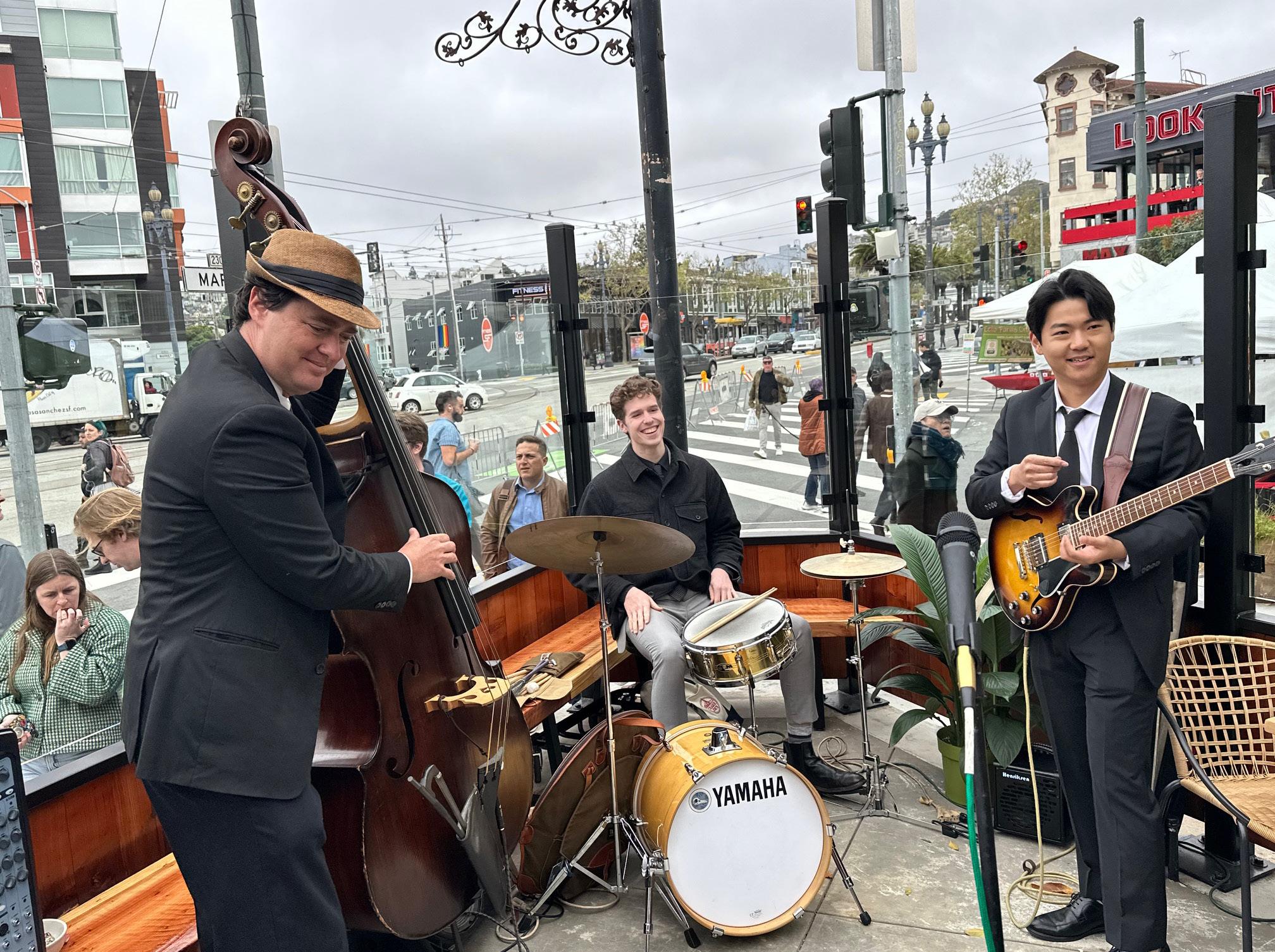

April 11-17, 2024 • Bay area reporter • 15 t Resurrection & Theater >>
Kristina Wong in her solo show, ‘Kristina Wong, Sweatshop Overlord’
Kevin Berne
Rumi Missabu
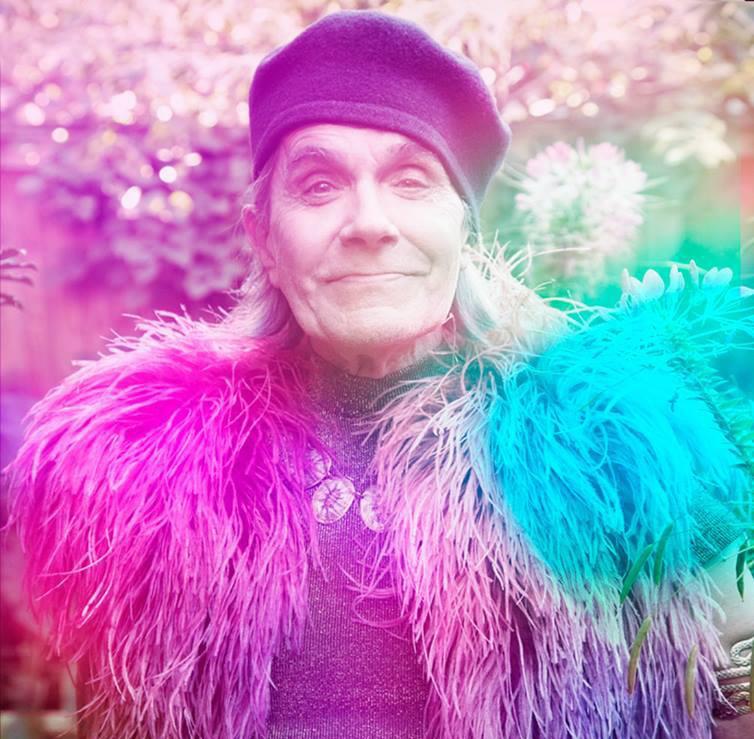
 by Jim Provenzano
by Jim Provenzano
Rumi Missabu, one of the last original Cockettes, and a film, music and theater artist, died in his Oakland home on April 2. He was 76.
Rumi was a founding member of the radical drag group born out of Haight-Ashbury queer hippie communes in 1969. The Cockettes grew from obscurity to national fame during their brief two-year existence.
Missabu performed in several of the shows, known for sometimes chaotic but hilarious musicals and revues, but later went on to other artistic accomplishments. When San Francisco revivals of the musicals began to gain devoted audiences, Missabu returned to revive one of his favorite roles.
Hollywood and a bad trip
Born James Allen Bartlett on November 14, 1947 in Los Angeles, he was the son of Earl Oliver Bartlett and Ruth Irene Bartlett. He is survived by sisters Mary Dobyns and Debbie Mitzlaff; sister Linda Gail Bartlett died in 2018.
His fascination with Hollywood and show business began early. He even performed in a high school production of “The Miracle Worker” with a young Sally Field. When his family moved to Iowa in 1965, he stayed in LA and attended Los Angeles City College.
What led him to come to San Francisco was in part a B-horror movie and a bad acid trip. When he saw the film “She-Freak” while on LSD, he rushed back to the LA apartment he shared with then-unknown actress Cindy Williams, leaving her a note that said, “I can’t take it anymore.”
He hopped on a Greyhound bus to Berkeley. For a while he lived with lesbian poet Carol Graham in a water tower on San Pablo Avenue in the back of a hippie shop run by a biker gang, the Gypsy Jokers.
In the late 1960s, Bartlett decided to change his name to Rumi, after the Persian poet. His connection to the Cockettes began from meeting Hibiscus (George Harris), whom he described as “a vision; he was everywhere” in the Haight Ashbury district.
The Cockettes sprung from a group housing commune and then, inspired by musicals of the 1930s, they decided to put on gender-fuck shows with a psychedelic twist, often under-rehearsed, with elaborate drag and costumes.
Their first performance on New Year’s Eve 1969 was held at the Palace Theater in North Beach. But this was not merely a drag show.
In one of several interviews with August Bernadicou of the LGBTQ History Project (www.lgbtqhp.org), Missabu discussed the troupe’s true nature.
“We weren’t just a bunch of swishy faggots which young people to this day who don’t do their homework think we were,” said Missabu. “The
Cockettes also were not just gay men. The group included women, straight guys, a baby, everything and everyone under the kitchen sink. Anyone could be a Cockette. All you needed to do was to show up in the audience and jump on stage. We resented all the theatrical law, we resented direction, we resented choreography, and we resented charging money.”
Little drag rascals
Despite this, acclaim for the group grew as the gay revolution continued in the midst of the East Coast Stonewall uprising. “The Cockettes” film codirector David Weissman described them as “The Little Rascals doing Busby Berkeley musicals on acid,” which Rumi often quoted.
Occasionally, shows included unusually talented performers like Sylvester and Divine, who both soon left and went on to greater fame.
A notorious flop performance in New York City (Rumi did not participate) seemed to tarnish the company’s success, but for them, that wasn’t the point to begin with.
“We didn’t know how political we were because we had no need for rhetoric,” Missabu told Bernadicou. “It was the underground press that made us these political darlings. We were so anti-establishment. We didn’t think about that. We were just out to have a good time. While our shows may have been interpreted as political, they were really just excuses to have a party, find boyfriends, and get laid.”
After a year and a half of performing in shows like “Les Ghouls,” where his Mick Jagger impersonation wowed audiences, and performing in the 1972 cult film “Elevator Girls in Bondage,” Rumi left the Cockettes when the company’s board had become a bit too egotistical for his liking, and Hibiscus was thrown out.

Rumi and others quit as well. He traveled to Canada, then lived in New York City from 1971-1974, where he performed in Angels of Light shows with Hibiscus as well as cocreating “happenings” with Marta Minujin. Lacking proper ID for a plane ticket, he then hitchhiked back to San Francisco. For three decades, he lived without a government ID, work record, or social security number, barely getting by with under-the-table temp jobs. His only form of identification was an expired San Francisco library card.
Reprise
In 2002, David Weissman and Bill Weber’s acclaimed documentary “The Cockettes” brought renewed attention

and devotion to the group, as well as their historical significance.
Their shows were later revived by musical director and original Cockette Scrumbly Koldewyn, and Russell Blackwood of Thrillpeddlers at the South of Market Hypnodrome theater, which presented “Hot Greeks,” “Vice
Palace,” “Pearls Over Shanghai” and other shows from 2002 to 2017. He also performed in Marc Huestis’s production of “Marat/Sade” at Brava Theatre.
When former Cockette Kreemah Ritz died in 2005, Rumi, who was his executor, collected his materials and became the Cockettes’ archivist, giving him a new purpose in life.
Rumi later suffered physical disability, and by 2008 he was diagnosed with chronic COPD.
Despite his health problems, from 2009 to 2014 Missabu joined the new Cockettes ensemble for revivals of “Pearls Over Shanghai,” re-creating his role as Madame Gin Sling.
“The young cast members keep me going,” said Missabu in my backstage interview with “Pearls” cast members in April 2014 for the Bay Area Reporter.
In remembering his early shows with the Cockettes, Missabu mentioned the Savoy Tivoli, and the Palace Theatre, where sex, pot and other shenanigans were common in the balcony at their shows. “It was a free-for-all. The cops never bothered us, because it was run by graft and gangsters!”
Honors and encores
Frequently staying with friend Ford Wheeler in New York City from 2007 to 2019, he performing in his play, “The War,” at the historic Judson Church, among other productions.
See page 17 >>

16 • Bay area reporter • April 11-17, 2024
Original Cockettes member and performing artist, Nov. 14, 1947-April 2, 2024 t << Rememberance
Rumi Missabu
Veronica Barra
Rumi Missabu
Steven Love Menendez
Rumi Missabu (center) in a scene from the film ‘Ruminations’
Rumi Missabu in 2002
Daniel Nicoletta
Rumi Missabu as Madame Gin Sling in the Thrillpeddlers revival of the Cockettes show ‘Pearls Over Shanghai,’ June 13, 2009
Daniel Nicoletta
David Wise
Preserving queer history
by David-Elijah Nahmod
More often than not, queer history is either forgotten or rewritten until it bears little resemblance to what really happened. Now, two podcasts seek to set the record straight, so to speak, by telling our stories accurately.
One of these is The Queercore Podcast, a production of the LGBTQ History Project. The project seeks to preserve the lives and legacies of LGBTQ activists from the first wave of gay liberation. The podcast is a forum for archival interviews that History Project’s August Bernadicou has collected since he was thirteen years old. The interviews are overlaid with music and with what Bernadicou calls his “silky smooth narrations.”
Kickin’
The other podcast is called Kickass Queers, and is co-hosted by Larry Womack and Rachel Stuart. According to Womack, their podcast tells the life stories of queer trailblazers, innovators, and pioneers. He and Stuart tell the truth, which sometimes goes against the grain of popular opinion. For example, they dispel the long-held belief that early trans activists Sylvia Rivera and Marsha P. Johnson started the Stonewall Riots.
“Sylvia arrived later, to join in them, and we talk about how that’s actually more kickass than just happening to be there at the time,” Womack said in an interview with the Bay Area Reporter. “And it’s a good example of why

it’s so important to look at primary sources, not the thousand readily available derivatives of the same Village Voice obituary. We look at primary sources and accounts by actual witnesses, like Marsha P. Johnson and eventually Sylvia herself, whose viewpoints command respect.”
One of Womack’s favorite episodes is when he and Stuart discussed the life of Storm DeLarverie, an early mixed race lesbian activist and drag king.
“Our research (with the Delarverie episode) really pays off and we’re able
to offer listeners full and compelling stories they’re not going to find on Wikipedia,” Womack said. “I also like it when we have a really good guest, like Paul M. Smith, who argued ‘Lawrence v Texas’ before the Supreme Court.” Womack added that he and Stuart take doing research very seriously. They like to go to first-hand sources and conduct interviews when possible. They try to avoid doing episodes where all the sources are online.
“Our show is not a prosaic lecture on the history of queer culture,” said


<< Rumi Missabu
From page 16
He later befriended gay historian August Bernadicou, who recorded multiple interviews for his website and podcast, became Rumi’s biographer and edited his memoir, “Off the Grid,” Missabu’s tall tales include his encounters with Jim Morrison, Allen Ginsberg, Rex Reed and many other celebrities.
By 2016, he began to suffer from cancer, and the medication also took a toll on his health. Yet Missabu continued to perform in small theater projects and independent films in New York. Missabu performed “I Wonder What Became of Me,” a concert of songs by Johnny Mercer and Harold Arlen, at the New York Public Library for the Performing Arts at Lincoln Center to inaugurate The Rumi
Stuart. “Nor is it a vapid tell-all. It is both and more. Our queer ancestors did some kickass stuff, and did and experienced some really stupid stuff, and funny stuff, and heartbreaking stuff. Fully humanizing our forgotten queer pioneers means bringing the wide range of their experiences to the forefront.”
Going Queercore
“The Queercore Podcast” is very similar, and isn’t afraid to take stands that some might consider controversial. In one three-part episode, it questions the role Gilbert Baker played in creating the Rainbow Flag, giving much of the credit to a woman who went by the name of Faerie Argyle Rainbow, who is heard on the podcast.
“We do not make controversial statements,” said Bernadicou. “Rather, we let people who were there tell their own stories in their own words. It’s the story of one woman versus the world. Sometimes you need to be direct to make a point. There is more than enough credit to go around.”
Bernadicou is concerned that pivotal figures in the LGBTQ movement are having their legacies minimized or sometimes erased during their lifetimes.
“I enjoy giving people an opportunity to tell their own stories in their own words,” he said. “In some ways I am creating history by spotlighting people who have made a significant impact but could be forgotten. Being the pastor of countless people’s legacies is sometimes a burden, but is al-

Missabu Papers at the library.
Taylor Mac, who has said that he owes his artistry to the Cockettes, also paid tribute to Rumi by bringing him out on stage during his “Holiday Sauce” show at the Curran Theater in 2018, where Missabu was given a “Legendary Queen” award.
In the same year, Robert James’ documentary “Ruminations” was released, showing Rumi traversing hospital visits amid his renewed fame and artistic rejuvenation.
Missabu lived in Oakland through his last years.
A memorial potluck and roast with the theme “Afternoon of a Thousand Rumis” is being planned by Missabu’s caregiver Griffin Cloudwalker for a later date, possibly Memorial Day Weekend in May. Donate to costs for the memorial and other expenses at https://gofund.me/e22d7db6
An additional fundraiser for funeral services is being organized by his sister, Mary Dobyns: www.gofundme. com/f/in-memory-of-my-brotherjames-allen-bartlett
A New York City memorial will be held at the Bureau of General Studies; Queer Division bookstore at the LGBT Community Center, 208 West 13th St., on May 9 at 7pm. The event will be live-streamed. www.gaycenter. org/spaces/bgsqd/ t
ways lightened by love.”
The first episode of Queercore’s second season featured members of the New York Gay Liberation Front, including author Perry Brass. Bernadicou has a deep interest in this movement because it was the first time gay people fought back, employing marches and protests. He feels that the Gay Liberation Movement destroyed everything heteronormative.
“Gay rights are about assimilation,” he said. “Gay liberation is about complete freedom. I am not interested in gay marriage being our saving grace. It’s nice to have, not a must have. I want to paint each white picket fence black. Overall, I want people to be happy. Assimilation is just not for me.”
Bernadicou finds a lot of satisfaction in what he does. When he’s told be people that they know who Bambi Lake or Rumi Missabu were because of his efforts, then he knows what he’s doing is worth it.
“I have over 230 recordings of Rumi on the phone,” he said (See the Rumi Missabu obituary in this week’s issue). “Can you imagine how well you know someone if you have that many recordings of them talking? It’s as close as you can get to knowing every part of someone’s life. More so than my other closest friends. It’s having someone’s entire legacy in your brain, on your hard drive, and in your file cabinet.”t
Kickass Queers podcast: kickass-queers.captivate.fm/ The Queercore Podcast: lgbtqhp.org/queercore-podcast



April 11-17, 2024 • Bay area reporter • 17
t Podcasts >> 3991-A 17th Street, Market & Castro 415-864-9795 Proudly serving the community since 1977.
Daily! New Adjusted Hours Monday 8am (last seating 9:45pm) Tuesday 8am (last seating 9:45pm) Wednesday 8am (last seating 9:45pm) Thursday 8am Open 24 Hours Friday Open 24 Hours Saturday Open 24 Hours Sunday 7am (last seating 9:45pm)
Open
Rumi Missabu performing in New York in 2018
Jackie Rudin
Faerie Argyle Rainbow, co-creator of the Rainbow Flag
Left: Gay activist and author Perry Brass (left) with Queercore Podcast host August Bernadicou Right: Kickass Queers co-hosts Rachel Stuart and Larry Womack
Garrard Conley’s remarkable debut novel
by Tim Pfaff
Garrard Conley made his name with “Boy Erased,” his frank memoir of surviving gay conversion therapy and the movie it spawned, both of which did not just entertain readers but in fact saved lives. But no memoir, however salient, guarantees success in a first novel. With “All the World Beside,” Conley has scored one.
He’s taken the trouble to research the past deeply enough to arrive at a historical novel that makes its own world –and invites its audience in.
The history he explores is that of the 18th-century American phenomenon known as the Great Awakening –or, as my American-literature-teaching mother formulated it, the culmination of “plain living and high thinking.”
Almost improbably, Conley has created from that chowder a meal that goes right down. The writing is masterful but un-self-flattering. The story is as linear as human life, with its twists and turns, flash-forwards and flashbacks, will allow.
The language is startling in its unstartlingness, consciously and painstakingly turning away from verbal acrobatics and rhetorical enigmas. It moves you right along, and then it moves you deeply. All this novel lacks is artifice.
His principal characters – the Reverend Nathaniel Whitfield and Dr. Arthur Lyman – exude same-sex male eroticism without suffering the reductive pigeonholing of being “gay” characters. And if the men are buffeted by the slings and arrows of avoiding outrageous fortune, the ladies, too, confront the hazards of the particulate
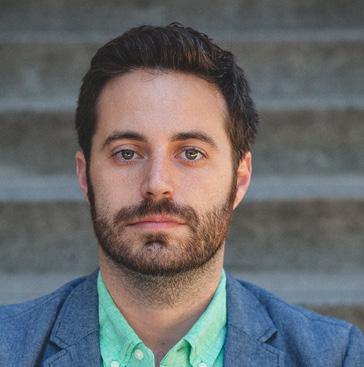
breezes the men stir up. A good time is had by almost no one but the reader. The story is set in the mythical town of Cana, Massachusetts, a Puritan settlement in what once was Mohican land. The resonance is with the Biblical Cana, where Jesus turned water into wine for a wedding. But such as this novel has a set theology, it is of the kind Kierkegaard called “thoughts that wound from behind.”
The bleeding heart of Conley’s story is the clandestine passion of the two principals, who unsurprisingly have to travel or at least take to the woods to sat-
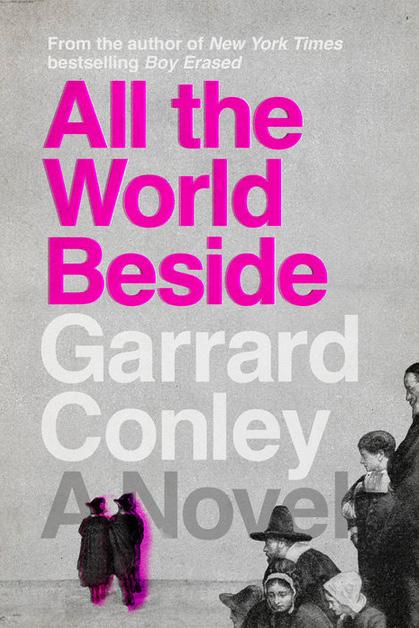
isfy it, and their desperate mutual pacts to get over it if not quite each other.
His genius lies in the telling detail: the scent of sex with another brought home to a spouse, the cringing distance between the two men when their families gather for entertainment, lips that tell more than they should, the letters an unsuspecting child discovers tucked into a book.
Here’s Conley’s meditation on the timelessness of desire as much as the shame following the act: “Down at the Wharf when he and his family had lived in Boston, the seaman had
passed by Arthur, who was pretending to admire the waves lapping the piles,” he writes. “Then, in a swift motion Arthur had come to associate with these assignations, the man had returned, permitting his arm to graze Arthur’s hips. Arthur waited a few moments before following the man down a narrow alley….
“Always it had been this way with the men Arthur met at the wharves. Whatever pleasure he found there had soon been eclipsed by the trade, and he was able to tell himself the animal moans that escaped his mouth as the
men entered him were merely a part of the price of his science.”
The plot thickens without curdling or confounding. The women characters are as deftly drawn as the men, and the individual stories, compelling on their own terms, intertwine like a choking vine. That said, what could be unrelievedly deadly is leavened by the occasion wink of recognition, and authorial fellow-feeling.
One wrong pitch and this novel could have gone astray, too high or too low. But it feels like what is said about the good Reverend’s preaching: “They say his speech placed such guilt in their hearts, and was spoken with such deep emotion, that the crying lasted for several hours. People fell out of the pews and broke into violent paroxysms upon the ground. We had no word for it. Now we call it an awakening, a revival.”
“All the World Beside” cauterizes such guilt with a deep compassion. But what must have been Conley’s struggle is not the reader’s. As he writes of the Reverend’s method, “It is his life’s glory, these words; they come to him unbidden. Sometimes, after he finishes, he allows himself to marvel at the pages.”
Himself a true, if transformed, believer, Conley leaves the marveling to the reader.t
Read the full review on www.ebar.com.
Garrard Conley, ‘All the World Beside,’ Riverhead Books, $28, 335 pages, penguinrandomhouse.com
Gay Iranian poet’s collection emits new light
by Mark William Norby
Armenian Persian-speaking Iranian-American poet Armen Davoudian grew up in Isfahan, Iran. His second collection of poetry, “The Palace of Forty Pillars” (Tin House), introduces the arrival of a future star in modern poetry and a gay Iranian who emigrated from Iran to America in 2018 when he was 17. Davoudian is currently completing a PhD at Stanford University.
This is a book to hold close. Davoudian is a magnet for gentleness as equally a braveness for the expressions he now writes far from his homeland. In the subtlest of manners, he proves himself beyond well-
equipped in poetic meter. Underlying his verse are surprising moments of form and content. Perhaps his style has something to do with feeling out of place in his own country of origin.
Beauty amid threats
“From the beginning I had an ambivalent relationship to Iran and to the concept of origins in general, an ambivalence deepened when I started realizing I’m gay,” said Davoudian. “In the Islamic republic, sex out of heterosexual wedlock is technically punishable by death.”
While the death sentence is not often carried out for being queer in Iran, one can imagine the visceral trauma of the death threat hanging over your
head for being gay, and what that would feel like while growing up.
But Iran is also a place of beauty and inspiration for Davoudian. He cherishes his memories when he was a child, and mainly refers to those moments in the book. He grew up in a “beautiful neighborhood called Julfa” where centuries-old architecture fills much of his work in “Forty Pillars.”
Two stanzas from a twenty-page poem perfectly display his talent and reflections of those memories. In a poem that encapsulates Davoudian’s own separation from his home country, here is an excerpt from a poem that shares the same name as the book’s title, “The Palace of Forty Pillars.”
the boy who’s waiting for another. All is dual: two rows of roses frame the pool, in twos the swans glide, each on another’s breast, then fuse in a headless embrace. All is dissolved: the boy outside the water is no more
In the seventeenth century, Armenians faced a forced relocation at the hands of Safavid King Shah Abbas of Iran. In Davoudian’s art we get part of this deep history. We get queerness in Iran from a poet, an individual sensitive to all of the complexities and all of the sufferings of the Armenian people, and we get the boy looking back at the boy he was, and the boys he left behind.
After reading the entire book, which one can do in a few days, you feel you’ve been to Iran, you’ve especially gone to Isfahan. Thankfully, we have Armen Davoudian as our tour guide.t
Read the full review on www.ebar.com.




Professional
Twenty pillars drip into the pool their likenesses, where the likeness of a boy wavers among the clouds, eyeing
A boy inside the water – his no more the face defaced by its own lines on shattered waves overlapping like a rose, the tattered pillars strewn like petals. All is halved, severed, like home and school, like love and being loved – the boy no more than a way of seeing.
‘The Palace of Forty Pillars’ by Armen Davoudian. Tin House, $16.95. www.tinhouse.com www.armendavoudian.com


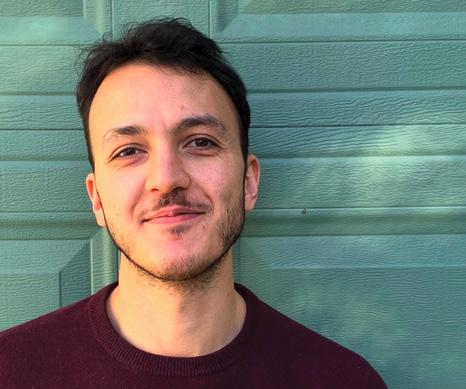





18 • Bay area reporter • April 11-17, 2024 t << Books StevenUnderhill 415 370 7152 • StevenUnderhill.com
headshots / profile pics Weddings / Events UNDERHILL.indd 1 4/9/24 3:20 PM StevenUnderhill 415 370 7152 • StevenUnderhill.com
Professional
headshots / profile pics Weddings / Events UNDERHILL.indd 1 4/9/24 3:20 PM
Author Garrard Conley
Author Armen Davoudian
Pre-Pride playlist
 by Gregg Shapiro
by Gregg Shapiro
In South Florida where I live, Pride begins early (in Hollywood in January), despite the Red State’s rulers’ intentions to erase us, and continues through October (in Miami Shores). While other places aren’t as fortunate, that doesn’t mean they can’t prepare well in advance of their Pride observances by listening to all the wonderful LGBTQ music available to us.
Led by queer musician and historian Eve Sicular (of Metropolitan Klezmer fame), Isle of Klezbos bring an all-female energy to the klezmer (instrumental, jazz-inflected) music genre.
For the sextet’s newest album, “Yiddish Silver Screen,” credited to Isle of Klezbos & Friends (including out singer/songwriter Natalia Zukerman), the sextet, while also celebrating its silver anniversary, takes listeners to the movies (You can almost smell the popcorn!) with distinctive and pleasing interpretations of music featuring tunes from the Yiddish cinema. The blend of instrumental (such as the marvelous “Bonia Shur’s Nigun & Cartagena Chosidl”) and vocal (“Circus Lullaby”) numbers result in a sparkling listening experience. www.klezbos.com
Dragapella quartet The Kinsey Sicks has reason to celebrate. July 2024
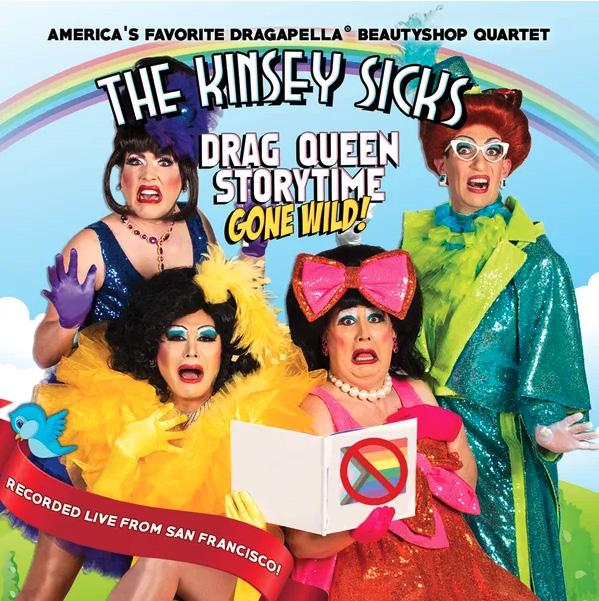
marks the comedic vocal group’s 30th anniversary. The foursome has gone through numerous changes over those years, including the departure of longtime/founding member Winnie (Irwin Keller), and the performance retirement of longtime/founding member Rachel (Ben Schatz, who continues to write parody lyrics for the “gals”).
“Drag Queen Story Time Gone Wild!,” The Kinsey Sicks 12th album (including two holiday recordings) was recorded live in San Francisco. While not as polished as previous releases, suffering from a dimming of their shimmer and chemistry, and a reliance on more shock value than usual, there are still plenty of notable numbers, including “Poof the Magic Drag Queen,” “Poor Unfortunate Trolls,” “Everybody Loves a Drag Queen,” and “Tell Me How to Get to (Sesame Seeds).” Plus, the attacks on the current Florida governor pack an extra punch coming from, well, drag queens.
www.kinseysicks.com
When brilliant singer/songwriter Nanci Griffith died suddenly in 2021, the music world lost one of its beloved artists and the LGBTQ community lost a cherished ally. Out singer/songwriter Mary Gauthier not only wrote the beautiful liner notes for “More Than a Whisper: Celebrating the Music of Nanci Griffith” (Round-

er), but also performs a stunning rendition of the title tune.
Queer singer/songwriter Brandy Clark is also present with her reverent cover of Griffith’s “Gulf Coast Highway.” Other standouts by straight allies include “Love Wore a Halo (Back Before the War)” by Emmylou Harris, “It’s Hard Life Wherever You Go” by Steve Earle, “Outbound Plane” by Shawn Colvin, and “Late Night Grand Hotel” by Aaron Lee Tasjan. www.rounder.com
A few months after losing Griffith, we suffered another significant loss when musical genius Stephen Sondheim passed away in late 2021. Broadway actress and singer Melissa Errico, who has performed in the Sondheim musicals “Sunday in the Park with George” and “Passion,” paid tribute to the legendary theater composer/lyricist on her 2018 album “Sondheim Sublime.”
With her new album, “Sondheim in the City” (Concord Theatricals), she focuses on Sondheim’s lengthy love affair with his native New York in song. Her readings of “Another Hundred People,” “Broadway Baby,” “Uptown, Downtown,” “Take Me to The World,” “Being Alive,” “The Little Things You Do Together,” and the “Opening Doors/What More Do I Need?” medley, would all make Sondheim proud. www.melissaerrico.com



On first listen, “Sweet Pea” (Moxe), the new album by young (just 23), non-binary singer/songwriter Lila Blue, sounds like a subtle blend of Fiona Apple and Ani DiFranco. But upon repeated spins, you realize that this is a singular performer who’s able to pull our focus and keep us riveted from start to finish. The acoustic blues stomp of the title cut leads us into the mesmerizing chant of “Changeling” before slipping into the emotional folk of “How Could I.” And so it goes, with Lila Blue using every color at her disposal to dazzle us as she does on “I Met The Devil,” “High On A Hill,” and the lovely “Lovely Day.” www.lilabluemusic.comt



April 11-17, 2024 • Bay area reporter • 19
t Music &
>>
FABULOUS F**K BOY Model looks 6’ 150# 27yrs, 8” uncut beautiful tight yummy ass. Smoky sexuality Personals erotic male nympho. Hndsm hedonist. Str8, gay, married men at yr apt, hotel, mansion! Greek god Nick 415-818-3126. Leather fetish fantasy roleplay kink dom sub group scenes mild to wild. Pretty boy with a dirty mind, romantic & unforgettable! $400/hr, $2000 overnight neg. AUTO EROTICA PURVEYOR OF VINTAGE PORN MAGAZINES • BOOKS • PHOTOGRAPHS 4077A 18th St. OPEN EVERY DAY 415•861•5787{ { AUTO EROTICA PURVEYOR OF VINTAGE PORN MAGAZINES • BOOKS • PHOTOGRAPHS 4077A 18th St. OPEN EVERY DAY 415•861•5787{ { AUTO EROTICA PURVEYOR OF VINTAGE PORN MAGAZINES • BOOKS • PHOTOGRAPHS 4077A 18th St. OPEN EVERY DAY 415•861•5787{ { WE BUY & SELL GAY STUFF! MONDAY-SATURDAY Going out We’ve got a great line-up of arts and nightlife events, like this line-up of Baloney hunks, now playing at Oasis (see photo). Check it out this week and every week in Going Out on www.ebar.com. Baloney SF
Music from Isle of Klezbos, Kinsey Sicks, Lila Blue & more
Events
Models>>

Get a powerful connection that works all over your home. That’s Wall-to-Wall WiFi from Xfinity. Fast, reliable coverage that extends from room to room to even that room you thought you’d never get a signal in. On all of your devices, even when everyone is online. Only with Xfinity.
shine.
WiFi that goes where the sun don’t
Ends 6/21/24. Restrictions apply. Not available in all areas. New Gigabit Internet and Xfinity Mobile Unlimited Intro customers only. Offer requires enrollment in both paperless billing and automatic payments with stored bank account. Without enrollment, the monthly service charge automatically increases by $10 (or $5 if enrolling with credit or debit card information). The discount will appear on your bill within 45 days of enrolling in automatic payments and paperless billing. If either automatic payments or paperless billing are subsequently canceled, the $10 monthly discount will be removed automatically. All other installation, taxes & fees extra, and subject to change during and after promo. After 24 months, or if any service is canceled or downgraded, regular charges apply to internet service and WiFi equipment. Service limited to a single outlet. May not be combined with other offers. Internet: Actual speeds vary and not guaranteed. For factors affecting speed visit www.xfinity.com/networkmanagement. Call for restrictions and complete details, or visit xfinity.com. All devices must be returned when service ends. WiFi Boost Pods sold separately. Mobile: Requires residential post-pay Xfinity Internet service. Line limitations may apply. For Xfinity Mobile Broadband Disclosures visit: www.xfinity.com/mobile/policies/broadband-disclosures. For factors affecting speed visit www.xfinity.com/networkmanagement. Actual savings vary and are not guaranteed. Call for restrictions and complete details or visit xfinity.com. © 2024 Comcast. All rights reserved. NPA400505-0041 1-800-xfinity xfinity.com Visit a store today Xfinity Gig Internet FREE WiFi equipment included $25 a month for 2 years with no annual contract when you add Unlimited mobile Requires paperless billing and autopay with stored bank account. Taxes and other charges extra and subject to change. See details below. Regular Xfinity Mobile rates apply. Reduced speeds after 20 GB of usage/line. Data thresholds may vary. 1004051_NPA400505-0041 West 25x24 9.75x16.indd 1 3/28/24 7:33 PM











































 by Jim Gladstone
by Jim Gladstone
 by Brian Bromberger
by Brian Bromberger

 by Joshua Polanski
by Joshua Polanski















 by Jim Provenzano
by Jim Provenzano



















 by Gregg Shapiro
by Gregg Shapiro








